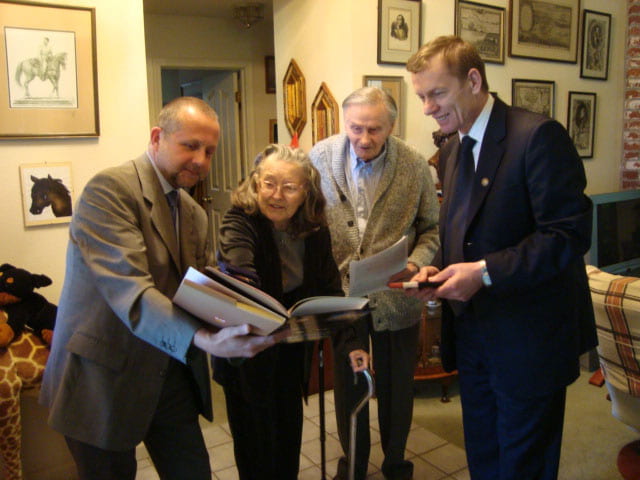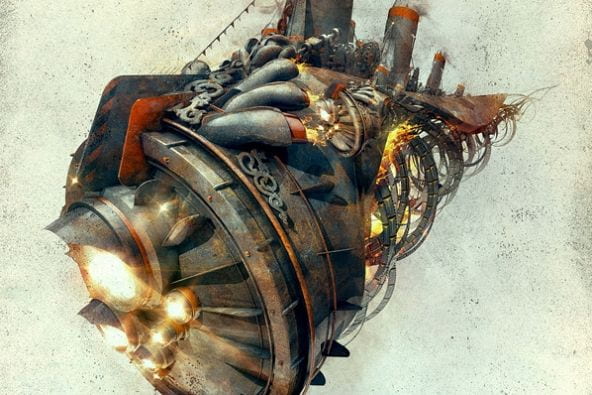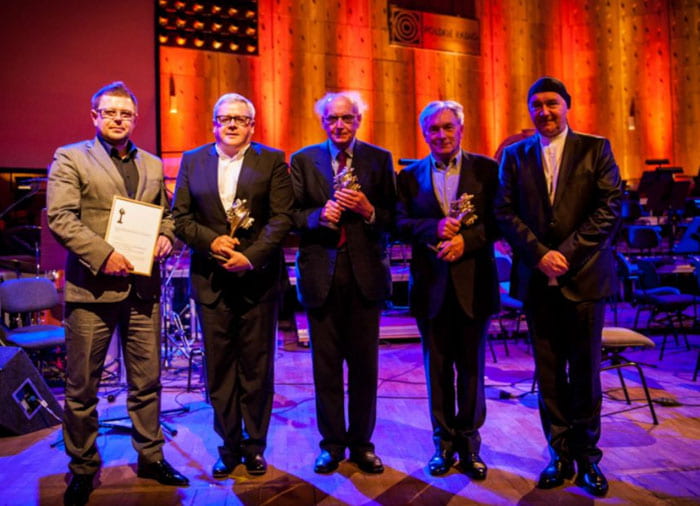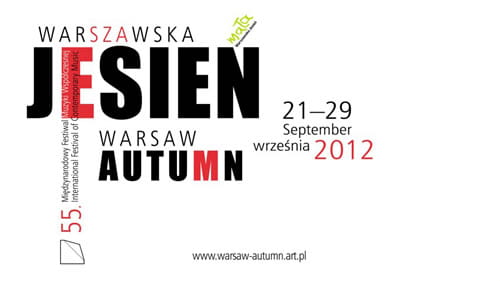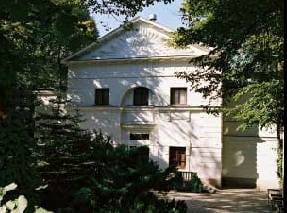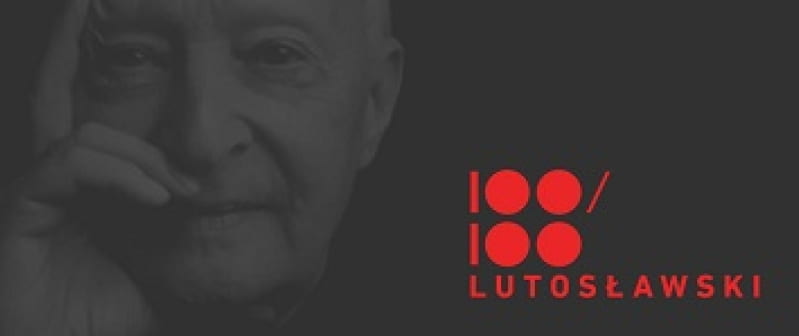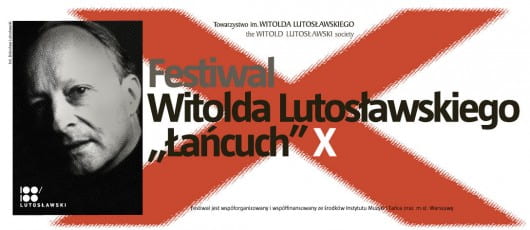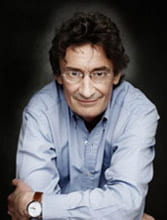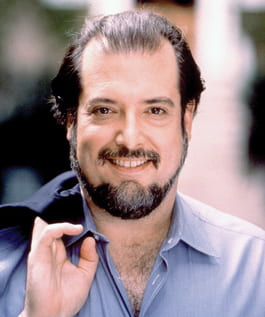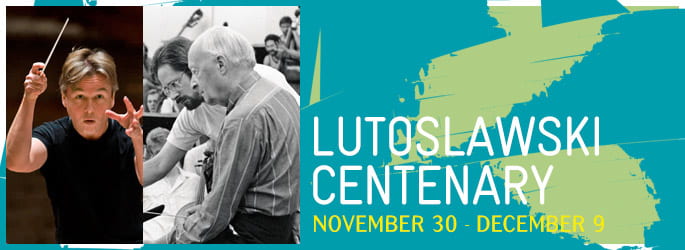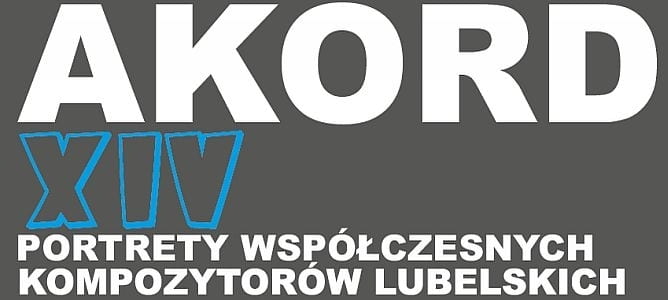Polish Music Newsletter Vol. 19, no. 1
2012 – Year in Review
Anniversaries
Wojciech Kilar: celebrating his 80th birthday on July 17 throughout 2012
Karol Szymanowski: celebrating his 130th birthday anniversary on October 6 and his 75th death anniversary on March 29. See tributes at the websites of PWM, Adam Mickiewicz Institute, scholar Adrian Thomas, Gramophone Magazine, and Musical Opinion
Janusz Korczak: the 70th death anniversary of this doctor and writer was celebrated with the world premiere of the Postcards from Beyond by Alexander Balanescu at Music in Old Krakow
Awards
Announced on Feb. 7, the winners of the 2012 “Młoda Polska” stipends awarded by the Polish Ministry of Culture and National Heritage included the following musicians: the BMF Piano Trio (Bartłomiej Wezner – piano, Michał Szałach – violin, Filip Syska – cello); composer Ewa Fabiańska; and composer Justyna Kowalska-Lasoń
Polish composer Krzysztof Penderecki received the 2012 ICMA Lifetime Achievement Award
The 2012 Witold Lutosławski Stipend went to composer Tomasz Jakub Opałka, awarded by Gabriela and Martin Bogusławski on behalf of the Witold Lutosławski Society
The 2012 “MocArty” Award—a new honor for young film composers including a statuette, €10K, and a year’s worth of RMF media patronage—was presented to Bartosz Chajdecki by RMF Classic Radio
Poland’s Institute for Music and Dance selected four ensembles and four young composers for its Composer-in-Residence program: Świętokrzyska Philharmonic in Kielce & Bartosz Kowalski, Amadeus Polish Radio Chamber Orchestra& Barbara Kaszuba, Toruń Symphony Orchestra & Jędrzej Roch Rochecki, and Płock Symphony Orchestra & Zuzanna Fabijańczyk (composers pictured above)
The International Jury of the 2012 Gaudeamus Prize in The Netherlands selected Umbrae B for string orchestra by Andrzej Kwieciński (Poland/The Netherlands) as one of the thirteen new compositions premiered during Gaudeamus Muziekweek in Utrecht from September 2-9
Polish-Canadian pianist Janina Fialkowska received the “2012 Governor General’s Performing Arts Award” for Lifetime Artistic Achievement in Classical Music—equivalent to the “Kennedy Center Awards” in the US
Winners of the 2012 Kosciuszko Foundation Sembrich Voice Scholarship Competition: 1st prize – Viktor Antipienko; 2nd prize – Julie-Ann Hamula; 3rd prize – Marta Wryk & Emily Newton ex-aequo
Poland’s International Television Network, TVP Polonia, selected PMC Director Marek Żebrowski for its annual TVP Polonia Award
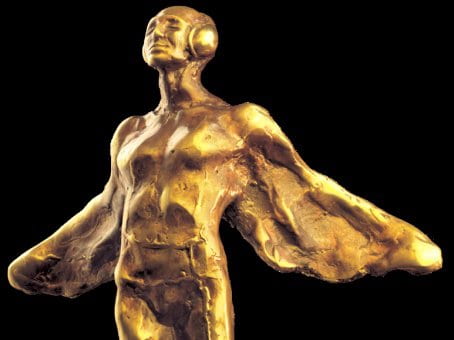 The 2012 Fryderyk Awards winners included – Lifetime Achievement (“Golden Fryderyk”): Wojciech Kilar; Phonographic Debut of the Year: Mariusz Kwiecień (Harmonia Mundi HMW906101); Composer of the Year: Paweł Mykietyn; Symphonic/Concert Album of the Year: Paderewski – Piano Concerto, Polish Fantasy / Kevin Kenner, piano (DUX 0733); Best Foreign Polish Album & Best Recording of Polish Music Krystian Zimerman – Hommage à Grażyna Bacewicz (Deutsche Grammophon/Universal Edition Poland 477 8332). To see all winners, visit: zpav.pl
The 2012 Fryderyk Awards winners included – Lifetime Achievement (“Golden Fryderyk”): Wojciech Kilar; Phonographic Debut of the Year: Mariusz Kwiecień (Harmonia Mundi HMW906101); Composer of the Year: Paweł Mykietyn; Symphonic/Concert Album of the Year: Paderewski – Piano Concerto, Polish Fantasy / Kevin Kenner, piano (DUX 0733); Best Foreign Polish Album & Best Recording of Polish Music Krystian Zimerman – Hommage à Grażyna Bacewicz (Deutsche Grammophon/Universal Edition Poland 477 8332). To see all winners, visit: zpav.pl
Composer Edward Dębicki—founder of the Roma Music Theater and the Society of Authors and Friends of the Gypsy Culture—was awarded the Golden Gloria Artis Award for Culture by Minister of Culture and National Heritage, Bogdan Zdrojewski, on April 12
On May 3, President Bronislaw Komorowski, presented several distinguished members of Poland’s music community with Poland’s highest honors at a ceremony in the Royal Castle in Warsaw: composer Wojciech Kilar – Order of the White Eagle, jazz trumpeter Tomasz Stańko – Commander’s Cross of the Order of the Polish Renaissance, and music promoter Elżbieta Penderecka and composer Zbigniew Preisner – Officer’s Cross of the Order of the Polish Renaissance
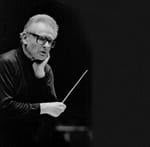 On May 17, Maestro Stanisław Skrowaczewski (left) received an honorary doctorate from the Karol Szymanowski Music Academy in Katowice, Poland
On May 17, Maestro Stanisław Skrowaczewski (left) received an honorary doctorate from the Karol Szymanowski Music Academy in Katowice, Poland
Musicologist Sławomira Żerańska-Kominek, composer Roman Berger and electronic musician Cezary Duchnowski were the recipients of the 2012 Polish Composers’ Union (ZKP) Annual Awards
The Tadeusz Baird Competition for Young Composers awarded its 2012 Main Prize Piotr Tabakiernik for Paroles gelées, as well as honorable mentions awards for SaHarBad by Maria Huszcza, Strzępysny by Kamil Kruk, and Enigma A.D. 2011by Dominik Lewicki.
On June 17 the Faculty of Theology at the University of Silesia in Katowice presented composer Wojciech Kilar with an honorary doctorate
Minister of Culture and National Heritage, Bogdan Zdrojewski, awarded a silver medal Gloria Artis to Michał Znaniecki—General Director of the Poznań Opera—on his 20th anniversary of artistic work
Bassoonist Katarzyna Zdybel won First Prize at the International Double Reed Society’s Gillet-Fox Bassoon Competition in Oxford, Ohio
Polish flautist Krzysztof Kaczka and his percussionist Reed Nicholas won the Award of Excellence for creativity/originality from the Global Music Awards for their recording of Chopin transcriptions for flute and marimba entitled Nostalgy (Acte Prealable AP0256)
Ars Nova artistic director Jacek Urbaniak received the Silver Cross of Merit awarded by the President of the Polish Republic, Bronisław Komorowski, and woodwind expert Krzysztof Owczynik received the Merit for Polish Culture Award presented by the Minister of Culture and National Heritage, Bogdan Zdrojewski
Transatlantyk Festival 2012 Awards:
- Glocal Hero Award – Elżbieta and Krzysztof Penderecki;
- Instant Composition – Jacek Szwaj (1st Prize), Marta Grzywacz (2nd Prize), Jacek Obstaczyk (3rd Prize), and Noam Sivan, Nikola Kołodziejczyk and Jarosław Praszczałek (Honorable Mention);
- Young Composer Award – Daniel Beijbom (1st Prize), Jan Glembotzki (2nd Prize), Paweł Pudło (3rd Prize), and Mikołaj Stroiński (Honorable Mention)
Winners of the IV International Grażyna Bacewicz Composers Competition:
• 1st Prize: Isabel Urrutia (Spain) for Haizearen nahiak – Concerto for Clarinet in Bflat and String Orchestra
• 2nd Prize: Manuel Martinez Burgos (Spain) for Generations for Violin Solo, String Orchestra and Percussion
• 3rd Prize: Grzegorz Duchnowski (Poland) for Oxygen for Alto Saxophone, Strings and Percussion
2012 Koryfeusz Awards (Oct. 1):
- Personality of the Year – composer and pianist Zygmunt Krauze;
- Music Event of the Year – musical collaboration of Krzysztof Penderecki/Jonny Greenwood/Aphex Twin/Marek Moś/AUKSO Chamber Orchestra;
- Merit Award – composer Wojciech Kilar (pictured above)
The 9th Grzegorz Fitelberg International Competition for Conductors (Nov. 16 – 25) in Katowice, Poland awarded the following: Gold Baton – Daniel Smith, Silver Baton – Marzena Diakun, Bronze Baton – Azis Sadikovic and Honorable Distinction – Maja Metelska
On Nov. 12, Polish composer Paweł Mykietyn received the prestigious Prix France Musique SACEM 2012 Award for his music for the film Essential Killing by Jerzy Skolimowski
Winners of the first Krzysztof Penderecki International Composers’ Competition ARBORETUM were premiered on Nov. 10:
- Prize I: Bartosz Kowalski-Banasewicz – Prismatic shapes for string orchestra (pictured at right)
- Prize II: Adam Porębski – …Stretched for strings
- Prize III (ex-aequo): Wojciech Błażejczyk – Introjection for string orchestra and Ignacy Zalewski – Poem for string orchestra
Winners of the 2012 Tadeusz Ochlewski Composition Competition: RiFFFonia by Paweł Piotr Pietruszewski (Grand Prize) and Semi-overture by Adam Porębski (Special Recognition)
Peter Moss has received the Honorary Lifetime Achievement “Wielki Splendor” [Grand Splendor] statuette for in the field of radio art from the Polish Radio Theatre
At the Gala Concert of the 2012 Paderewski Festival in Paso Robles, 6 Festival organizers were awarded the Medal of Merit to Polish Culture, awarded by the Minister of Culture and National Heritage, Bogdan Zdrojewski: Alice Cass, Krysta Close, Marjorie Hamon, Norma Moye, Barbara Partridge, and Cri Cri Solak-Eastin
Premieres
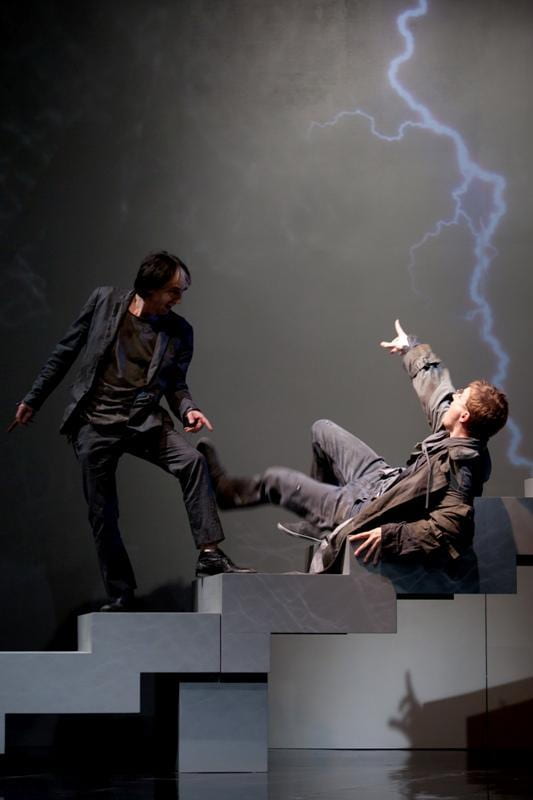 The World Premiere performance of the opera Ja, Kain [I, Cain] by Edward Pałłasz, with libretto by Joanna Kulmowa, was held on January 7 during Festival of Chamber Operas of the 20th and 21st Centuries in Warsaw (pictured at right)
The World Premiere performance of the opera Ja, Kain [I, Cain] by Edward Pałłasz, with libretto by Joanna Kulmowa, was held on January 7 during Festival of Chamber Operas of the 20th and 21st Centuries in Warsaw (pictured at right)
Following its 2011 “Year of Women,” the Grand Theatre in Poznań celebrated a “Year of Men” in 2012, with nine premieres focused on male characters, kicked off with the world premiere of Dzień Świra [The Day of the Crazy Guy] by Hadrian Filip Tabęcki on January 29
Maciej Zieliński’s Symphony No. 5 was premiered on January 29 at the Lutosławski Studio Concert Hall in Warsaw, by the commissioning ensemble, the Polish Radio Orchestra, for which Zieliński served as Composer in Residence during the 2011-2012 season
The world premiere of the ballet Chapters, choreographed by Krzysztof Pastor to the music of Witold Lutosławski’s Fourth Symphony, was given by the Dutch National Ballet [Het Nationale Ballet] on Feb. 15 Amsterdam’s Het Muziektheater
In honor of the 75th anniversary of Polish Radio “Dwójka” [Channel 2], works entitled Dedykacja by prominent “Generation XV” composers—Paweł Buczyński, Aleksander Kościów, Tomasz Jakub Opałka, Dariusz Przybylski, Ignacy Zalewski and Maciej Zieliński—were premiered by the Polish Radio Orchestra in the Lutosławski Studio Concert Hall in Warsaw on March 4
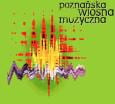 The 41st edition of the Poznań Spring Contemporary Music Festival was held March 23-28 and featured the following premieres: Artur Cieślak – Ekspresje for symphony orchestra (2012); Monika Kędziora – AEQUINOCTIUM for orchestra (2009); Rafał Zapała – Skaner for symphony orchestra, electronics and soundscape (2011); Katarzyna Taborowska – Emfaza for violin and symphony orchestra (2012); Agnieszka Zdrojek-Suchodolska – Three Movements for percussion and string orchestra (2011); Leszek Wisłocki -XIII String Quartet (2007); Janusz Stalmierski – String Quartet (2012); Michał Ossowski – consectetur for choir (2012); Wojciech Widłak – Kyrie for 8-part mixed choir a cappella (2010); Jarosław Kozłowski – Chinese Precision for tape (2012); and Mateusz Ryczek – Miedziane niebo for soprano and live electronics (2011)
The 41st edition of the Poznań Spring Contemporary Music Festival was held March 23-28 and featured the following premieres: Artur Cieślak – Ekspresje for symphony orchestra (2012); Monika Kędziora – AEQUINOCTIUM for orchestra (2009); Rafał Zapała – Skaner for symphony orchestra, electronics and soundscape (2011); Katarzyna Taborowska – Emfaza for violin and symphony orchestra (2012); Agnieszka Zdrojek-Suchodolska – Three Movements for percussion and string orchestra (2011); Leszek Wisłocki -XIII String Quartet (2007); Janusz Stalmierski – String Quartet (2012); Michał Ossowski – consectetur for choir (2012); Wojciech Widłak – Kyrie for 8-part mixed choir a cappella (2010); Jarosław Kozłowski – Chinese Precision for tape (2012); and Mateusz Ryczek – Miedziane niebo for soprano and live electronics (2011)
On May 19, the Kronos Quartet performed the world premiere of a new work by Hanna Kulenty which they commissioned—String Quartet No. 5—in Rotterdam, the Netherlands
Commissioned by the Pilgrim Chamber Players, From the Fever-World for mezzo-soprano, string quartet, and piano—a new work composed by Joanna Bruzdowicz, based on prize-winning poetry by the American writer Jehanne Dubrow—was premiered on May 13 in Chicago
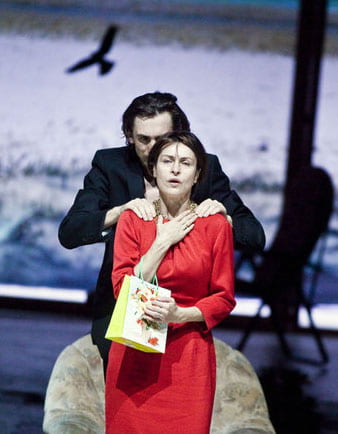 Co-commissioned by the National Theatre and the Grand Theatre [Teatr Wielki] – Polish National Opera— Poland’s two largest stage companies—composer Agata Zubel and director Maja Kleczewska joined forces to create a new dramatoopera entitled Oresteia, using Maciej Słomczyński’s translation of the great Greek text, and it was premiered on April 14 in Warsaw (pictured at right)
Co-commissioned by the National Theatre and the Grand Theatre [Teatr Wielki] – Polish National Opera— Poland’s two largest stage companies—composer Agata Zubel and director Maja Kleczewska joined forces to create a new dramatoopera entitled Oresteia, using Maciej Słomczyński’s translation of the great Greek text, and it was premiered on April 14 in Warsaw (pictured at right)
Premieres by Polish composers at the 28th edition of the Musica Polonica Nova Festival (April 20-28, 2012):
- Mateusz Ryczek (b.1986) – Infrasymphony (2010)
- Sławomir Kupczak (b.1979) – Hummingbirds for symphony orchestra (2012)
- Jagoda Szmytka (b.1982) – Open the box! for accordion and shadow theatre (2011)
- Adam Porębski (b.1990) – Cut Story (2012)
- Dariusz Przybylski (b.1984) – Sonata da chiesa (2012) and Red, Yellow, Red. Hommage a Mark Rothko for string orchestra (2012)
- Andrzej Krzanowski (b.1951-1990) – Sonata No. 2 (1987)
- Rafał Zalech (b.1988)– Prelude and Fugue for solo accordion (2012)
- Rafał Janiak (b.1986) – Sonata awakening – movement – cogitation (2012)
- Cezary Duchnowski (b.1971) – acc++ca for accordion and computer (2012) and The End of Poetry for voice, electric cello, electronics and orchestral groups (2012)
- Michał Moc (b.1977) – Call for details for organ and accordion (2012)
- Piotr Drożdżewski (b.1948) – En blanc for solo organ (2012)
- Krzysztof Wołek (b.1976) – Yamantaka for 2 marimbas and electronics (2011)
- Ryszard Osada (b.1972) – Waves of feelings for 2 marimbas (2012)
- Jacek Sotomski (b.1987) MAHOMET for 2 marimbas and computer (2012)
- Joanna Woźny (b.1973) – Lost Motion for string orchestra (2012)
- Adrian Foltyn (b.1978) – Coincidensity for 17 string instruments and bass clarinet (2011)
- Grażyna Pstrokońska-Nawratil (b.1947)– ICE-LAND …Rainbow Bridges over Dettifoss… (Reportage 3) for chamber orchestra (2011)
- Marcin Bortnowski (b.1972) – And There Was No More Sea for harpsichord and chamber orchestra (2012)
- Jagoda Szmytka (b.1982) – Watch out! of the box (as Luis B. says) for violin, piano and computer (2011)
- Wojciech Ziemowit Zych (b.1976) – Gesture and Pulse for violin and 8 loudspeakers (2010)
- Wojciech Blecharz (b.1981) – Phenotype for violin with electronics (2012)
- Sławomir Wojciechowski (b.1971) – Double Pendulum for violin and computer (2012)
- Zbigniew Bargielski (b.1937) – Im Niemandsland – new version of oratorium to words of Psalms and Markus Jaroschka’s poems for 2 singers, 2 narrators, 2 choral groups and 2 instrumental groups (1989/2012)
- Paweł Hendrich (1979) – Metasolidus II for great symphony orchestra / Cryptoscript for computer (2012)
Polish-Canadian composer Piotr Grella-Możejko had world premieres of several of his works in March and April: Stolte for alto saxophone and computer soundtrack (2010) was given by its dedicatee, Charles Stolte, in Phoenix; Τάρταρος IV [Tartarus IV] for digitally processed sounds and video (2012) by composer and Tombeau sur la mort de Monsieur Górecki for amplified alto flute, live electronics and orchestra (2010) Agnieszka Kaćma at the Festival of Polish Music in Kielce; and IWONAriette for flute solo (2012) was given by dedicatee Iwona Glinka, and Xρόνοστάσις (Theodore Antoniou at 77) for woodwind quintet (2012) by Aiolos Woodwind Quintet in Greece
The world premiere of Zygmunt Krauze’s new work 11 Preludes by Chopin for wind instrument ensemble was performed by the Nederlands Blazers Ensemble, who commissioned the work, in April in the Netherlands
 In commemoration of Holocaust Remembrance Day, Music of Remembrance (MOR) presented the world premiere of Jake Heggie’s opera Another Sunrise about Polish resistance fighter and poet, Krystyna Zywulska. During the concert on May 14 at Seattle’s Benaroya Hall, audiences also heard Szymon Laks’ Third String Quartet—parts for this unpublished work were furnished via the PMC Manuscript Collection
In commemoration of Holocaust Remembrance Day, Music of Remembrance (MOR) presented the world premiere of Jake Heggie’s opera Another Sunrise about Polish resistance fighter and poet, Krystyna Zywulska. During the concert on May 14 at Seattle’s Benaroya Hall, audiences also heard Szymon Laks’ Third String Quartet—parts for this unpublished work were furnished via the PMC Manuscript Collection
During the Warsaw Music Encounters (May 12-19), the Warsaw Phil Chamber Orchetra premiered Grzegorz Duchnowski’s Wariacje kurpiowskie for string orchestra, Edward Sielicki’s Differentia specifica (Una fantasia quasi tango) for soprano saxophone and string orchestra (2006/2009), and Krzesimir Dębski’s Trois nouvellettes for strings (2012), and the Wilanów Quartet premiered Władysław Słowiński’s Funebre for string quartet (2012)
The premiere of a new piece by Marek Pasieczny (b.1980) entitled Concerto Chaconne for guitar and string quartet took place during the XV International Guitar Music Festival on June 7 in Trzęsacz
2012 Warsaw Autumn premieres: Jagoda Szmytka [Happy Deaf People], Artur Zagajewski [Canto], Pierre Jodlowski [Hyperspeed Disconnected Motions], Aleksandra Gryka [Observerobserver], Wojciech Blecharz [Means of Protection], Maciej Jabłoński [Księżycowy Pierrot or Lunar Pierrot], Tadeusz Wielecki [Punkty słyszenia (Points of Hearing)], Stanisław Bromboszcz [Con tensione] and Lidia Zielińska [Ukiyo]
The world premiere of Symphony No. 3 “Song of Angels” by Paweł Łukaszewski (b. 1968) was given at the International Sacred Music Festival in Riga, Latvia on Aug. 28
 King Lear, a new musical composed by Paweł Mykietyn, waspremiered by Ensemble Modern Orchestra at the Sacrum Profanum Festival, which also featured 4 monographic concerts for young Polish composers: Aleksander Nowak, Marcin Stańczyk, Cezary Duchnowski, and Agata Zubel
King Lear, a new musical composed by Paweł Mykietyn, waspremiered by Ensemble Modern Orchestra at the Sacrum Profanum Festival, which also featured 4 monographic concerts for young Polish composers: Aleksander Nowak, Marcin Stańczyk, Cezary Duchnowski, and Agata Zubel
The premiere of Paweł Łukaszewski’s Advent Music for string orchestra was given by the Baltic Neopolis Orchestra (pictured at right), the dedicatee of the work, on Sept. 29 in Szczecin
PMC News
The PMC Festival of Premieres explored the contemporary cultural landscape of Poland and Lithuania with premieres by works of Vykintas Baltakas, Veronika Krausas, Krzysztof Meyer and Marek Żebrowski, performed by pianist Aron Kallay, violinist Janet Packer and pianist Anthony Padilla on March 23-34
 Symphony of the Vines presented a program of Karłowicz, Haydn and Mozart with PMC director Marek Żebrowski at the piano on April 24
Symphony of the Vines presented a program of Karłowicz, Haydn and Mozart with PMC director Marek Żebrowski at the piano on April 24
 Terri Wilson of Connecticut donated the precious historical manuscript entitled Zbiór Najużywańszych Pieśni Melodyjnych [A Collection of the Most Used Melodious Songs], an anonymously hand-written set of popular Polish hymns that is dated 1897
Terri Wilson of Connecticut donated the precious historical manuscript entitled Zbiór Najużywańszych Pieśni Melodyjnych [A Collection of the Most Used Melodious Songs], an anonymously hand-written set of popular Polish hymns that is dated 1897
Donations from TVP journalist Violetta Rotter-Kozera: DVDs of Karol Stryja—Ślązak, który zdobył świat [Karol Stryja—A Silesian who Conquered the World] and Pod banderą Chopina [Under the Flag of Chopin]
During visits for the Festival of Premieres and others, composer Joanna Bruzdowicz made several donations in 2012, including: scores of Episode pour piano et treize cordes and the SymphonyNo.2 “Concertino pour orchestre symphonique; LP recording of La Colonie Pénitentiare; and a framed and inscribed poster of her opera, Trojanki (1972)
Dr. Lorenzo Sanchez brought Paderewski’s Sonata for piano in E-flat minor, Op. 21, back to Paso Robles during the 2012 Paderewski Festival Fall Fundraiser, benefitting the 2012 Paderewski Festival and Youth Exchange in Paso Robles
 In Aug. and Sept., cellist Lars Hoefs—USC Thornton graduate and Polish music enthusiast—and PMC Director and pianist Marek Żebrowski toured France, Italy, the Ukraine and Poland performing works by Paderewski, Stojowski and Chopin
In Aug. and Sept., cellist Lars Hoefs—USC Thornton graduate and Polish music enthusiast—and PMC Director and pianist Marek Żebrowski toured France, Italy, the Ukraine and Poland performing works by Paderewski, Stojowski and Chopin
Żebrowski and Hoefs performing during the Muzyka na Szczytach Festival in Zakopane, Sept. 2012.
[Photo: Regina Watycha, via malopolskaonline.pl]
 On October 14, the 2012 Paderewski Lecture-Recital celebrated Szymanowski’s anniversary with a lecture by Maestro Grzegorz Nowak of the Royal Philharmonic, and a recital by Los Angeles favorites Mark Robson, piano and Timur Bekbosunov, tenor
On October 14, the 2012 Paderewski Lecture-Recital celebrated Szymanowski’s anniversary with a lecture by Maestro Grzegorz Nowak of the Royal Philharmonic, and a recital by Los Angeles favorites Mark Robson, piano and Timur Bekbosunov, tenor
The 2012 Paderewski Festival in Paso Robles was dominated by extraordinary young musicians, including violinist Kinga Augustyn, pianist and magician Igor Lipiński, 2012 Exchange participants from Poland and winners of the 2012 Paderewski Piano Competition. The Festival Board also unveiled a monument to Paderewski in the City Park
Publications
Mistrzowie i przyjaciele [Masters and Friends]
by Krzysztof Meyer
ISBN: 978-83-224-0937-4, Polish Music Publishers [PWM]
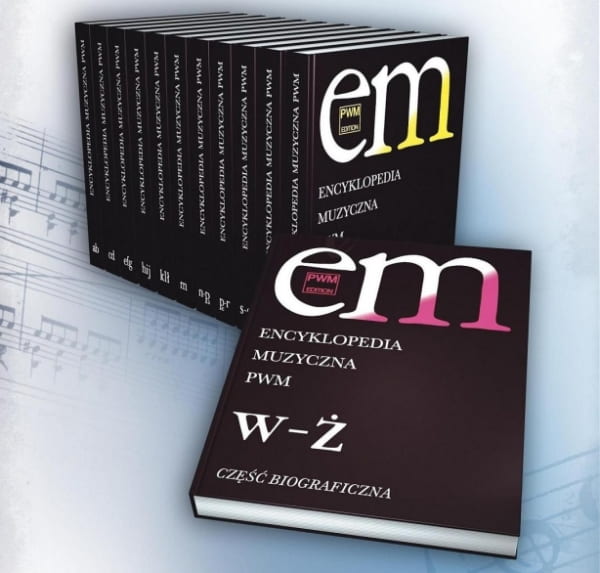 PWM Music Encyclopedia – 12th and final volume
PWM Music Encyclopedia – 12th and final volume
Edited by Elżbieta Dziębowska
ISBN: 978-83-224-935-0, Polish Music Publishers [PWM]
The first 2012 issue of Glissando Magazine, entitled Junge Komponisten aus Polen auf Deutsch [Young Polish Composers in German] (No. 19), presents an extensive overview of the current musical scene in Poland to the German-speaking audience. The most recent issue, Muzyka Szwajcarska (No. 20), explores the Swiss music scene and its influence in Poland
Published by PWM Editions, the 2012 issues of the English-language Quarta Magazine were dedicated to Wojciech Kilar (March) and Justyna Kowalska-Lasoń (Sept.)—available online at issuu.com
Witold Lutosławski: O muzyce. Pisma i wypowiedzi [Witold Lutosławski: About Music – Speeches and Writings]
Edited by Zbigniew Skowroń
ISBN 978-83-7453-078-1, Terytoria
News
Inspired by the outpouring of international attention surrounding the one-year anniversary of Henryk Mikołaj Górecki’s passing, from Jan. 16-22 Q2 Music—NY Public Radio station WQXR’s online portal for contemporary classical music—presented Muzyka Nowa, a festival of Polish music ranging from 20th Century greats Lutosławski, Penderecki and Górecki to lesser-known and emerging Polish composers such as Krzysztof Wołek, Agata Zubel and Aleksander Nowak
Outsider, czyli portret Romana Maciejewskiego [Outsider, the portrait of composer Roman Maciejewski], a 1993 documentary film by Stefan Szlachtycz, was shown on February 29 on TVP Kultura
Polish mezzo-soprano Marta Wryk made her professional debut with the Virginia Opera in the role of Aglaonice in a production of Phillip Glass’ Orphee on January 28 and served as artist-in-residence for the rest of the 2011-2012 season
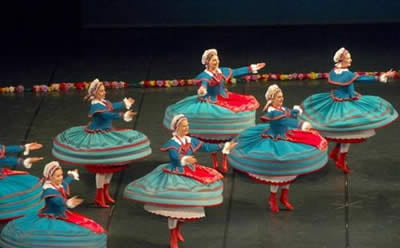 Due to economic struggles at the regional and national levels, important cultural institutions such as the Warsaw Chamber Opera and Mazowsze dance ensemble (pictured above) have been threatened with cancellations and strikes
Due to economic struggles at the regional and national levels, important cultural institutions such as the Warsaw Chamber Opera and Mazowsze dance ensemble (pictured above) have been threatened with cancellations and strikes
Entitled “Maria Szymanowska (1789 – 1831), a Woman of Europe,” the international project housed at www.maria-szymanowska.eu is intended to promote Polish pianist and composer Maria Szymanowska
WFMT in Chicago aired a two-hour documentary entitled, A Romantic Master Rediscovered: Zygmunt Stojowski on Aug. 26, featuring British pianist Jonathan Plowright, Polish conductor Łukasz Borowicz, Polish-American Stojowski scholar Joseph A. Herter, and American professor Henry Fogel
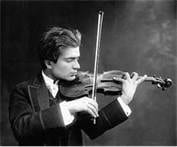 The Philharmonic Orchestra in Częstochowa was named after the famous Polish-Jewish violinist Bronisław Huberman (1882-1947), who advocated political and religious tolerance and pan-Europeanism
The Philharmonic Orchestra in Częstochowa was named after the famous Polish-Jewish violinist Bronisław Huberman (1882-1947), who advocated political and religious tolerance and pan-Europeanism
Krzysztof Urbański was nominated the chief guest conductor of the Tokyo Symphony Orchestra, and debuted at the Hollywood Bowl in Sept. (see L.A. Times: Music review: Young conductor impresses with L.A. Phil at Bowl)
 A new website featuring composer Kazimierz Serocki (1922-1981) was launched at www.polmic.ncse.pl—the first view of its kind, especially in English, into the mysterious world of this elusive yet prolific composer
A new website featuring composer Kazimierz Serocki (1922-1981) was launched at www.polmic.ncse.pl—the first view of its kind, especially in English, into the mysterious world of this elusive yet prolific composer
A new documentary film, entitled Please find – Henryk Mikołaj Górecki and directed by Violetta Rotter-Kozera of TVP Katowice, was released in Nov., with some footage filmed at USC
Recordings
The newest album from the 2005 Chopin Competition winner, Rafał Blechacz:
 Rafał Blechacz – Debussy · Szymanowski
Rafał Blechacz – Debussy · Szymanowski
Claude Debussy (1862 – 1918): Pour le piano and Estampes; Karol Szymanowski (1882 – 1937): Prelude and Fugue in C-sharp minor, Sonata No. 1 in C minor, op.8, and Fugue
Rafał Blechacz, piano
Deutsche Grammophon 477 9548
Meadow Quartet creates a space for the conflicting influences of contemporary chamber music, jazz, improvised music, film music and traditional Jewish music in:
 Meadow Quartet – Unexpected
Meadow Quartet – Unexpected
Das Schloss, Goldene Medina, Nature’s Tool, Le Printemps, L’automne, Immersion, Form No. 1, Extinct
Meadow Quartet: Marcin Malinowski – clarinet; Michał Piwowarczyk – viola; Piotr Skowroński – accordion; Jarosław Stokowski – bass
self-released
17-year old Polish-Canadian pianist Jan Lisiecki makes his debut recording on the prestigious Deutsche Grammophon label:
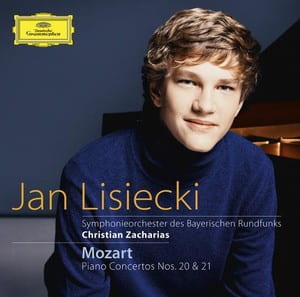 Jan Lisiecki – Mozart
Jan Lisiecki – Mozart
W. A. Mozart: Piano Concertos No. 20 KV 466 and No. 21 KV 467
Jan Lisiecki, piano; Symphonieorchester des Bayerischen Rundfunks; Christian Zacharias, cond.
Deutsche Grammophon 0289 479 0061 0
Representing a new wave of Polish jazz combining influences of pop, ethnic or indie music, Quaardvarktet self-published their debut album full of original compositions in April:
 Quaardvarktet – Debutee
Quaardvarktet – Debutee
Quaardvarktet: Two In One, Tim’s Trane, Kawka Przed Robotą, Zbee Plays Marimba; Miles Davis/Ron Carter: Eighty-One
Paweł Południak – trombone; Piotr Lipowicz – guitar; Paweł Wszołek – bass; and Piotr Budniak – drums.
quaardvarktet.bandcamp.com
RMF Classics and Sony Music released a 2-CD set of some of Kilar’s greatest hits as performed by the best orchestras in Poland
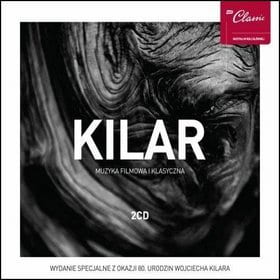 Kilar: Classical and Film Music
Kilar: Classical and Film Music
Wojciech Kilar (b. 1932): 2 CDs of classical compositions and works for film—for a full listing of tracks, see rmfclassic.pl
National Polish Radio Symphony Orchestra (NOSPR), Antoni Wit and Konrad Bryzek, cond.; Silesian Philharmonic Orchestra; Mirosław Jacek Błaszczyk, cond.; Warsaw National Philharmonic, Antoni Wit, cond.; Kapela Góralska Jana Karpiela “Bułecki”; Stanislaw Hadyn “Śląsk” Folk Song and Dance Troupe
Sony Music/RMF Classic 88725438352
CD Accord publications has released a new album containing all existing symphonic poems by composer Eugeniusz Morawski:
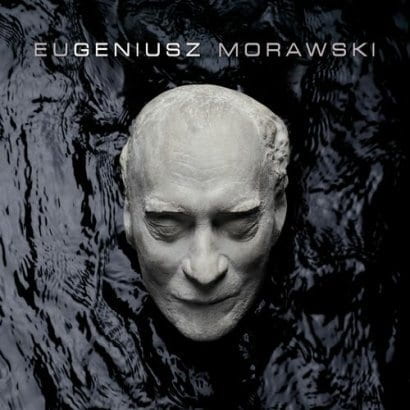 Eugeniusz Morawski – Symphonic Poems
Eugeniusz Morawski – Symphonic Poems
Eugeniusz Morawski-Dabrowa (1876-1948): Don Quichotte; Ulalume; Nevermore
Sinfonia Varsovia, Monika Wolińska – cond.
CD Accord ACD 176
Flautist Adrianna Lis, a USC Thornton School of Music graduate, released her debut album:
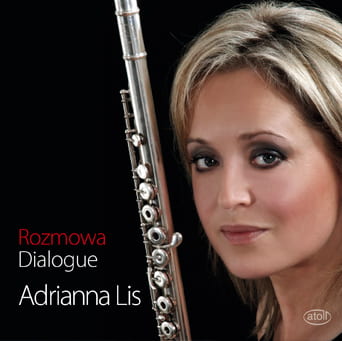 DIALOGUE/ROZMOWA
DIALOGUE/ROZMOWA
Sonatine – Dialogue between Wind and Snow by Gao Ping; Sonatina for flute and piano by Wojciech Kilar; When We Fell by Michael Williams; The Conversation of Prayer by Roxanna Panufnik; Sonata Medgugorska by Łukasz Woś; 4 pieces from ‘Rainforest’ by Jack Body; Polish Dances Op. 155 by Anthony Ritchie; and The Melbourne Cup by Michał Rosiak
Adrianna Lis – flute; Sarah Watkins – piano
Atoll Records ACD 742
The first CD recorded independently by the Wrocław Philharmonic Choir presents Polish poetry set to music by Polish composers:
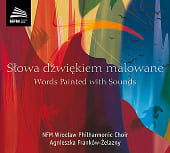 Słowa dźwiękiem malowane [Words Painted with Sounds]
Słowa dźwiękiem malowane [Words Painted with Sounds]
Jan Antoni Wichrowski – Elegy for a Polish Boy – songs for mixed choir to words by Krzysztof Kamil Baczyński; Józef Świder – Prayer to Mother of God (words Krzysztof Kamil Baczyński), Lullaby (words Krzysztof Kamil Baczyński), Dance (words Krzysztof Kamil Baczyński), Song about Happiness (words Krzysztof Kamil Baczyński), My Song (words Cyprian Kamil Norwid); The Seasons (words Leopold Staff), Autumn (words Leopold Staff), I Like It When at the End of Day (words Leopold Staff); Four Sonnets to words by Leopold Staff; Zofia Urbanyi-Krasnodębska – Over the Grave of Julia Capuletti (words Cyprian kamil Norwid); Ignacy Jan Paderewski (arr. Stanisław Wiechowicz) – Tears Have Flown (words Adam Mickiewicz), By the Wide Water (words Adam Mickiewicz), The Piper’s Song (words Adam Mickiewicz); So Much (words Adam Mickiewicz); Stanisław Niewiadomski (arr.Stanisław Wiechowicz) – Sophie (words Adam Mickiewicz)
Wrocław Philharmonic Choir; Agnieszka Franków-Żelazny – conductor
ACD 169
British pianist (and honorary Pole) Jonathan Plowright has teamed up with the Polish/Ukrainian Szymanowski Quartet:
 Zarebski/Zelenski: Piano Quintet & Piano Quartet
Zarebski/Zelenski: Piano Quintet & Piano Quartet
Władysław Żeleński (1837-1921): Piano Quartet in C minor Op 61, and Juliusz Zarębski (1854-1885): Piano Quintet in G minor Op 34
Jonathan Plowright – piano, Szymanowski Quartet
Hyperion CDA67905
Celebrating the stylistic collision of folk music, improvisation, and20th century classicalmusic:
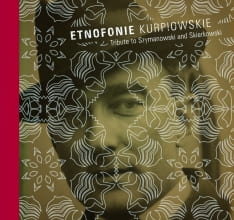 Etnofonie Kurpiowskie. Tribute to Szymanowski and Skierkowski
Etnofonie Kurpiowskie. Tribute to Szymanowski and Skierkowski
Published by 4ever Music, available at folk24.pl
2012 Koryfeusze Muzyki Polskiej Nominee
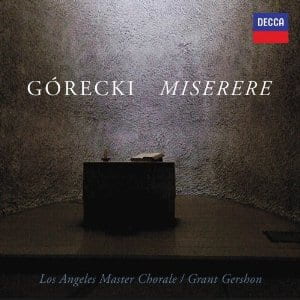 The Los Angeles Master Chorale’s tribute to the life and work of Henryk Mikołaj Górecki:
The Los Angeles Master Chorale’s tribute to the life and work of Henryk Mikołaj Górecki:
Górecki: Miserere
Henryk Mikołaj Górecki (1933-2010): Lobgesang, Op.76; Miserere, Op.44; Pieśni Maryjne, Op.54
Los Angeles Master Chorale, Grant Gershon – cond.
Decca CD 00289 478 3537, available at www.amazon.com
Performances
On Jan. 13-15, the Konzerthausorchester Berlin performed a concert entitled “Chopiniana” with the Russian pianist Alexei Volodin and Polish conductor Łukasz Borowicz, with a program including Chopin – Piano Concerto in F minor, Op. 21; Karłowicz – Eternal Songs, Op. 10; Panufnik – Lullaby for 29 strings and 2 harps; and Glazunov – Chopiniana, Op. 46
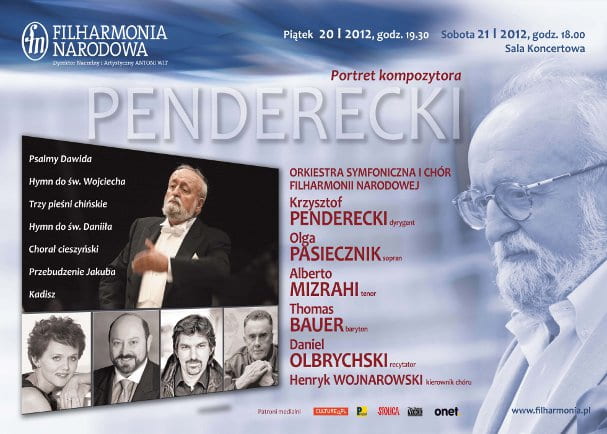 On Jan. 20-21, the Warsaw National Philharmonic Orchestra and Choir presented a “Composer Portrait” concert celebrating Krzysztof Penderecki, with soloists Olga Pasiecznik – soprano, Alberto Mizrahi – tenor, Thomas Bauer – baritone, and Daniel Olbrychski – recitation, and Penderecki as conductor. The concert featured three songs of a “municipal” nature—Hymn to St. Daniiła, written on the occasion of the 850th year of Moscow (1997); Hymn to St. Adalbert, written for the millennium of Gdańsk (1997); and the Cieszyń Choral, dedicated to the 1200th anniversary of the legendary founding of Cieszyń (2010)—as well as Three Chinese Songs, Psalms of David, The Awakening of Jacob, and Kadisz, dedicated to the memory of the victims of the Łódź ghetto and the Poles who saved Jews during the occupation
On Jan. 20-21, the Warsaw National Philharmonic Orchestra and Choir presented a “Composer Portrait” concert celebrating Krzysztof Penderecki, with soloists Olga Pasiecznik – soprano, Alberto Mizrahi – tenor, Thomas Bauer – baritone, and Daniel Olbrychski – recitation, and Penderecki as conductor. The concert featured three songs of a “municipal” nature—Hymn to St. Daniiła, written on the occasion of the 850th year of Moscow (1997); Hymn to St. Adalbert, written for the millennium of Gdańsk (1997); and the Cieszyń Choral, dedicated to the 1200th anniversary of the legendary founding of Cieszyń (2010)—as well as Three Chinese Songs, Psalms of David, The Awakening of Jacob, and Kadisz, dedicated to the memory of the victims of the Łódź ghetto and the Poles who saved Jews during the occupation
The North American tour of the Wrocław Philharmonic Orchestra (Feb. 8 – 26), led by artistic director Jacek Kaspszyk, included 1970 Chopin Competition winner Garrick Ohlsson and cello soloist Maciej Młodawski
On February 2, the Polish youth orchestra Sinfonia Iuventus performed works by Feliks Ignacy Dobrzyński with conductor Mariusz Smolij at the Witold Lutosławski Concert Studio of Polish Radio in Warsaw
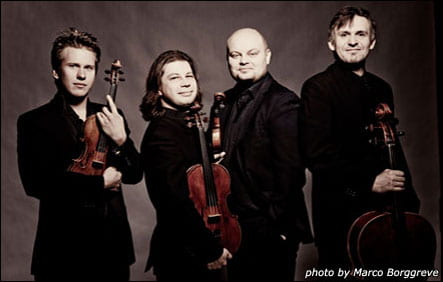 Warsaw-based Szymanowski Quartet—Andrej Bielow and Grzegorz Kotów, violins; Vladimir Mykytka, viola; Marcin Sieniawski, cello (left)—performed several sold-out concerts throughout the L.A. area in February
Warsaw-based Szymanowski Quartet—Andrej Bielow and Grzegorz Kotów, violins; Vladimir Mykytka, viola; Marcin Sieniawski, cello (left)—performed several sold-out concerts throughout the L.A. area in February
Award-winning composer and vocalist Agata Zubel was the featured artist at the Icebreaker Festival presented by the Seattle Chamber Players in February
On March 17, the Warsaw National Philharmonic featured the choral music of Paweł Łukaszewski, who served as composer-in-residence of the orchestra for the 2011/2012 season
 Camerata New York and Polish-Canadian pianist Katarzyna Musiał (right) performed H. M. Górecki’s Concerto for Harpsichord/Piano and Orchestra at the Kosciuszko Foundation in New York City on March 18
Camerata New York and Polish-Canadian pianist Katarzyna Musiał (right) performed H. M. Górecki’s Concerto for Harpsichord/Piano and Orchestra at the Kosciuszko Foundation in New York City on March 18
Krzysztof Penderecki and Radiohead guitarist Jonny Greenwood appeared together at London’s Barbican on March 22, performing Penderecki’s Polymorphia and Threnody to the Victims of Hiroshima, which inspired Greenwood to write the other two pieces performed on the program: Popcorn Superhet Receiver and 48 Responses to Polymorphia. The same program was released on Nonesuch Records on March 13—see www.beethoven.org.pl
The Warsaw University Library—which houses many manuscripts of Szymanowski and almost all those of Baird—honored Karol Szymanowski&rrsquo;s 75th death anniversary with a recital in the Tyszkiewicz Palace with pianist Piotr Banasik on March 29, featuring works by Szymanowski, Baird and Xawery Scharwenka
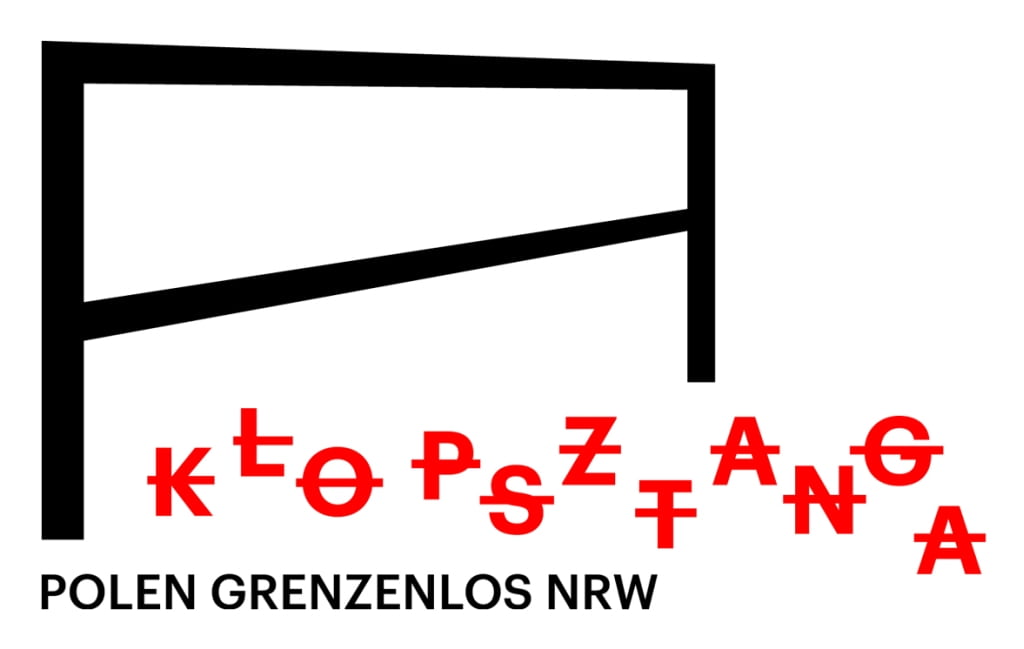 Klopsztanga: Polska bez granic / Polen grenzenlos [Klopsztanga: Poland without Borders], a unique project promoting Polish culture across Germany’s North Rhine-Westphalia region in 2012, kicked off in April
Klopsztanga: Polska bez granic / Polen grenzenlos [Klopsztanga: Poland without Borders], a unique project promoting Polish culture across Germany’s North Rhine-Westphalia region in 2012, kicked off in April
After his U.S. recital debut on April 28 at The Broad Stage in Santa Monica, Polish tenor Piotr Beczała was called “one of the new generation’s top three tenors” by Chris Pasles of the Los Angeles Times
Polish baritone Mariusz Kwiecień sang the title role in Don Giovanni as a part of the Los Angeles Philharmonic’s three-year “Mozart/ Da Ponte Trilogy” project this May
Organized by the Modjeska Club, pianist Maciej Grzybowski presented his “Keys & Clouds” recital program at the First Presbyterian Church in Santa Monica on May 11
A rare US appearance by the exceptional singer and driving force behind the renovation of the historic White Stork Synagogue in Wrocław, Poland, Bente Kahan celebrated her personal musical history at a Kosciuszko Foundation concert on May 30
 Los Angeles Master Chorale (LAMC) concluded its 48th season with a heartfelt, mostly a cappella tribute to celebrated Polish composer Henryk Mikołaj Górecki on June 10 at Walt Disney Concert Hall
Los Angeles Master Chorale (LAMC) concluded its 48th season with a heartfelt, mostly a cappella tribute to celebrated Polish composer Henryk Mikołaj Górecki on June 10 at Walt Disney Concert Hall
The Karol Szymanowski Music Society celebrated Szymanowski’s anniversary with 35 Days of Music in June and July
The 8th Festival of Polish Music in Kraków (July 13-21, 2012) featured performances of Nowowiejski’s Quo vadis by the Poznań Grand Opera Choir and Sinfonia Iuventus orchestra, and Roman Statkowski’s Maria by the Polish Radio Choir and Kraków Festival Orchestra, as well as performers Motion Trio (arrangements of Kilar, Górecki, Bacewicz and Chopin), Capella Cracoviensis, Yulianna Avdeeva, Sinfonietta Cracovia (works by Kilar, Krauze, and Palester), and Beata Bilińska
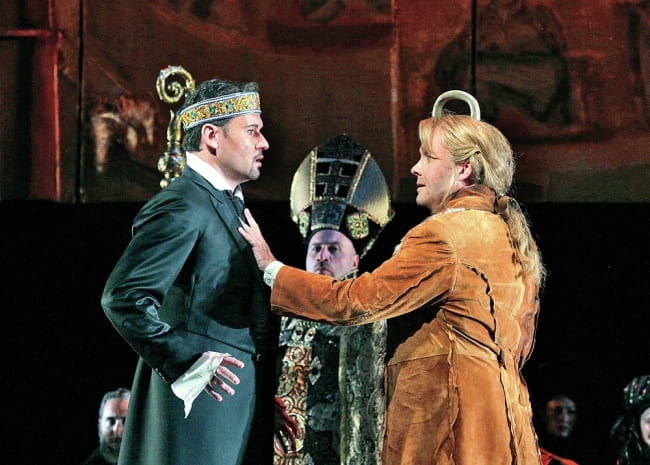 King Roger—the landmark opera by Karol Szymanowski—was performed by the prestigious Santa Fe Opera (TSFO), with Polish baritone Mariusz Kwiecień in the title role
King Roger—the landmark opera by Karol Szymanowski—was performed by the prestigious Santa Fe Opera (TSFO), with Polish baritone Mariusz Kwiecień in the title role
Michał Znaniecki celebrated Szymanowski’s anniversary in Buenos Aires, Argentina with performances of his one-act opera Hagith at Teatro Colón and a new musical theater project entitled Desconocidos [Unknown], based on Szymanowski’s novel Efebos
Listen / Touch / See: Polska Arts in Edinburgh, Scotland presented 180 performances, concerts and installations from the best contemporary Polish artists throughout the summer of 2012
Throughout the summer, the New Chamber Orchestra Foundation (FNOK) presented the Silent Concert series, where audiences enjoyed music in unexpected (and usually noisy places) through headphones
As a part of his Stańko+ program, internationally renowned Polish jazz trumpeter Tomasz Stańko focused on the works of Krzysztof Komeda at the 2012 Solidarity of Arts Festival (Aug. 8 – Sept. 2)
 Polish-Canadian-American pianist Berenika Zakrzewski completed an Asia-Pacific concert tour of 7 countries (at left, performing with the Hong Kong Chamber Symphony)
Polish-Canadian-American pianist Berenika Zakrzewski completed an Asia-Pacific concert tour of 7 countries (at left, performing with the Hong Kong Chamber Symphony)
Featuring Chopin Competition winner Yulianna Avdeeva, the Warsaw Philharmonic and Maestro Antoni Wit gave a17-concert US tour from Oct. 19 to Nov. 12
Pianist Maciej Grzybowski gave his 2nd US tour in Oct., with a program featuring Mykietyn, Lutosławski, Szymański, Szymanowski and Chopin—former L.A. times critic Walter Arlen said of his L.A. recital that “He is the greatest pianist I have heard in my life.… He breathes the music and brings out character no one else has found in it.”
 Pianist Anna Kijanowska (right) presented her “Homage to Karol Szymanowski” program in Beijing, Budapest, Inner Mongolia, London, and throughout the US
Pianist Anna Kijanowska (right) presented her “Homage to Karol Szymanowski” program in Beijing, Budapest, Inner Mongolia, London, and throughout the US
Organist Gedymin Grubba toured the US in Oct.
Soyoung Yoon, winner of the 2011 Wieniawski Violin Competition, presented a recital of Polish works at the 17th Górecki Festival of Music by Polish Composers in Bielsko-Biała, dedicated this year to Karol Szymanowski and Wojciech Kilar
Los Angeles Philharmonic celebrated the Lutosławski Centenary at Walt Disney Concert Hall on Nov. 30 – Dec. 9 (see review below)
17-year old pianist Jan Lisiecki performed with the New York Philharmonic and Daniel Harding – cond. on Dec. 13-15
Flautist Iwona Glinka performed a program of “Polish Romantic Masterworks” in Edmonton with Joachim Segger
The 22nd Composer’s Portraits Festival at the Mazovia Regional Centre of Culture and Art (Dec. 5-6) in Warsaw featured composers Katarzyna Taborowska (b. 1974), Leszek Wisłocki (b. 1931), and Jerzy Maksymiuk (b. 1936)
We Remember…
Nobel Prize-winning poet Wisława Szymborska (July 2, 1923- Feb. 1, 2012)
Musicologist and music critic Tadeusz Zieliński (May 22, 1931 – Feb. 25, 2012)
Violinist Roman Totenberg (January 1, 1911 – May 8, 2012)
Conductor of the Poznańskie Słowiki [Poznań Nightingales Choir] Stefan Stuligrosz (August 26, 1920 – June 15, 2012)
Polonia activist Daniel J. Kij (July 5, 1930 – August 2, 2012)
Polish soprano Maria Fołtyn (January 28, 1924 – December 2, 2012)
Lutosławski Year 2013
Lutosławski Year 2013: Overview
Per the proposal of the Ministry of Culture and National Heritage, the Sejm of the Republic of Poland has adopted a resolution declaring 2013 to be the Year of Lutosławski for the following reason:
“His works, performed at all major concert stages for over sixty years, shape new forms of beauty and reveal unique ideas of understanding and experience of the contemporary world. Originating from the great European tradition, from Beethoven and Chopin to Debussy and Bartók, he was also a patriot by virtue of his public activities and a world citizen through his works.”
The declaration was made official on December 7, 2012, at a press conference held in the Polish Radio’s Witold Lutosławski Concert Studio with the following significant cultural figures in attendance: Bogdan Zdrojewski, Minister of Culture and National Heritage; Andrzej Kosowski, Director of the Institute of Music and Dance (IMiT); Paweł Potoroczyn, Director of the Adam Mickiewicz Institute (IAM); Małgorzata Małaszko-Stasiewicz, Director of Polish Radio – Channel 2 (Dwójka); Michał Merczyński, Director of the National Audiovisual Institute (NINA); and Grzegorz Michalski, President of Witold Lutosławski Society. The conference was led by Ewa Bogusz-Moore of IAM’s Polska Music program. Lutosławski’s centenary has also been included in the prestigious international list of anniversaries under the auspices of the cultural body of the United Nations, UNESCO.
 The works and artistic achievements of Witold Lutosławski (1913-1994), as well as his awards, decorations, honorary degrees and other laurels, have confirmed his high position in the international music world. The composer, who wrote for Anne Sophie-Mutter, Mścisław Rostropowicz and Krystian Zimerman, recorded for Deutsche Grammophon and received the Nobel Prize for Music—“the Polar Music Prize”—belongs to this pantheon of world music. Witold Lutosławski was not only an outstanding composer and conductor, but also an erudite and Renaissance man, who was able to link the creative process with theoretical reflection.
The works and artistic achievements of Witold Lutosławski (1913-1994), as well as his awards, decorations, honorary degrees and other laurels, have confirmed his high position in the international music world. The composer, who wrote for Anne Sophie-Mutter, Mścisław Rostropowicz and Krystian Zimerman, recorded for Deutsche Grammophon and received the Nobel Prize for Music—“the Polar Music Prize”—belongs to this pantheon of world music. Witold Lutosławski was not only an outstanding composer and conductor, but also an erudite and Renaissance man, who was able to link the creative process with theoretical reflection.
Over the course of 2013, a rich program of concerts, educational and publishing events will be carried out jointly by the Institute of Music and Dance, Witold Lutosławski Society, Adam Mickiewicz Institute, National Audiovisual Institute and Fryderyk Chopin Institute. Some of the main event that will be launched in January include:
- 2013 Jubilee edition of the Łańcuch Festival
- mobile Guide to Lutosławski’s Warsaw
- the International Witold Lutosławski Competition for Composers (final due date: January 25, 2013 – Lutosławski’s birthday)
- the Philharmonia Orchestra’s Woven Words project website
- multi-media exhibition dedicated to Lutosławski’s life and works
The Ministry of Foreign Affairs and many other institutions, such as Polish Radio, Polskie Nagrania, PWM Editions and the Polish Composers’ Union have also joined the preparations for the anniversary celebration. Information about current projects will be regularly provided on the official website of the Year of Lutosławski: www.lutoslawski.culture.pl.
Through the “Lutosławski 2013 – Promise” program, the Ministry of Culture and National Heritage aims to fill the whole year with artistic, scientific, educational, documentary and promotional events dedicated to Witold Lutosławski and his works in the context of 20th-century music, history and culture. As a result of this program, nearly 100 additional artistic events will take place in Poland and abroad.
[Sources: imit.org.pl, polmic.pl, pwm.com.pl]
New Informational Websites
Mickiewicz Institute
 Poland’s Adam Mickiewicz Institute and the Ministry of Culture and National Heritage have launched lutoslawski.culture.pl as the official website of Lutosławski Year 2013. The site is also available in an English-language version.
Poland’s Adam Mickiewicz Institute and the Ministry of Culture and National Heritage have launched lutoslawski.culture.pl as the official website of Lutosławski Year 2013. The site is also available in an English-language version.
Institute of Music and Dance
 The Minister of Culture and National Heritage, Bogdan Zdrojewski, entrusted the Institute of Music and Dance with the task of organizing the Celebration Office, and appointed the director of IMIT to be responsible for the Year of Lutosławski. To publicize the planned events, IMiT has added a new tab dedicated to Lutosławski to its website: imit.org.pl.
The Minister of Culture and National Heritage, Bogdan Zdrojewski, entrusted the Institute of Music and Dance with the task of organizing the Celebration Office, and appointed the director of IMIT to be responsible for the Year of Lutosławski. To publicize the planned events, IMiT has added a new tab dedicated to Lutosławski to its website: imit.org.pl.
Witold Lutosławski Society
 A new website of the Lutosławski Society, www.lutoslawski.org.pl, also goes live in January. It will present many new and expanded materials about this important artist, including a detailed biography, a list of compositions with commentaries, an extensive collection of photographs, biographies of his friends, Lutosławski’s quotes about music and his writings on music, and of course all kinds of pertinent information regarding the publications, performances and other aspects relating to Lutosławski’s music.
A new website of the Lutosławski Society, www.lutoslawski.org.pl, also goes live in January. It will present many new and expanded materials about this important artist, including a detailed biography, a list of compositions with commentaries, an extensive collection of photographs, biographies of his friends, Lutosławski’s quotes about music and his writings on music, and of course all kinds of pertinent information regarding the publications, performances and other aspects relating to Lutosławski’s music.
Philharmonia Orchestra – Woven Words
The Philharmonia Orchestra and its Principal Conductor and Artistic Advisor, Esa-Pekka Salonen, have launched a landmark project celebrating the centenary of the birth of one of the twentieth-century’s most influential musical voices, Witold Lutosławski (1913-1994).
 Woven Words: Music Begins Where Words End is a pan-European portrait of Witold Lutosławski to celebrate his centenary, supported by Adam Mickiewicz Institute as part of Polska Music program. It includes orchestral music, chamber concerts, study days, film, online resources and commissioned articles celebrating the centenary of the birth of one of the century’s most influential musical voices. The Series Consultant is composer and Lutosławski specialist, Steven Stucky, who together with Salonen was mentored and inspired by Lutosławski.
Woven Words: Music Begins Where Words End is a pan-European portrait of Witold Lutosławski to celebrate his centenary, supported by Adam Mickiewicz Institute as part of Polska Music program. It includes orchestral music, chamber concerts, study days, film, online resources and commissioned articles celebrating the centenary of the birth of one of the century’s most influential musical voices. The Series Consultant is composer and Lutosławski specialist, Steven Stucky, who together with Salonen was mentored and inspired by Lutosławski.
Esa-Pekka Salonen’s tenure as Principal Conductor and Artistic Advisor of the Philharmonia Orchestra has been dominated by landmark multi-disciplinary festivals, exploring the music of key 20th century composers and musical movements in their widest possible cultural, social and historical context. Salonen commented:
Lutosławski is quite simply one of the most important voices of the twentieth century. This retrospective of his life, in what would have been his 100th birthday year, brings his absorbing, rich, intensely atmospheric music to new audiences, and our digital resources will create a lasting legacy that ensures that this anniversary lasts well beyond its 12-month duration, and the three months of our celebration. Our partnership with the Adam Mickiewicz Institute is allowing us to access source material, archive and historical material that has never been seen before outside Poland and illuminates Lutosławski’s life and work in unprecedented ways. I can’t wait to show the world everything that we are discovering.
Composer and Lutosławski biographer Steven Stucky offers this concise analysis of Lutosławski’s place in the musical pantheon:
Lutosławski emerged as one of the great masters of twentieth century music not through celebrity or fashion, but by virtue of his fundamental values: the ravishing beauty of his sound world, his rich harmonic language, his expressive melodic voice, his lucid forms, his attention to dramatic tension and release, and underlying everything, his drive to communicate.
[Source: chesternovello.com]
Concerts In January
Łańcuch X Festival
The Lutosławski Society’s Łańcuch Festival will open on January 24, the eve of Lutosławski’s birthday, with a performance of Muzyka Żałobna and Paroles tissées. This concert will also be an occasion to bestow special Lutosławski medals on the selected recipients. The Łańcuch Festival will run until February 9 and on its many concert programs besides Lutosławski’s compositions, works by Krzysztof Penderecki and Henryk Mikołaj Górecki will also be heard. Music by former and current Łutosławski Scholarship recipients, including by Grażyna and Andrzej Krzanowski, Aleksander Lasoń, Tadeusz Wielecki, Paweł Mykietyn and Tomasz Jakub Opałka, will also be on the Festival program.
This jubilee edition of the Festival will feature the most prestigious Polish orchestras, including the Katowice National Radio Symphony Orchestra (NOSPR), Polish Radio Symphony Orchestra, Aukso Chamber Orchestra, Sinfonia Varsovia, Sinfonietta Cracovia, and chorus of the National Opera Theatre. Łukasz Borowicz, Robert Kabara, Jacek Kaspszyk,Wojciech Michniewski, Marek Moś, Krzysztof Penderecki, Pierre-André Valade are among the conductors leading the Festival concerts. Festival soloists will include Anna Radziejewska, Elżbieta Szmytka, Marcel Beekman and Garrick Ohlsson.
The Łańcuch Festival will be augmented by the Łańcuszek Festival, dedicated to the youngest audiences, as well as master classes on interpreting Lutosławski’s music for students of music academies led by such famous professors as Jadwiga Rappé, Maja Nosowska and Andrzej Bauer. The entire Festival represents the joint efforts of the Lutosławski Society, participating ensembles and artists, owners of concert venues, and Polish Radio-Program II. Festival concerts will take place at the Warsaw Royal Castle, National Philharmonic Hall, and the Lutosławski Concert Studio at the Polish Radio in Warsaw.
[Source: press release via Witold Lutosławski Society]
Warsaw Phil: Inauguration of the Lutosławski Year & Szymański premiere
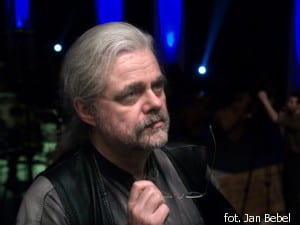 The 2013 Lutosławski Year will be officially inaugurated by the National Philharmonic Orchestra in Warsaw on January 25—exactly 100 years since the day of Lutosławski’s birth. As part of this special centenary concert, Paweł Szymański (left) will premiere his latest work Sostenuto, which was written especially for the Warsaw Philharmonic. Szymański’s ties to Lutosławski—beyond obvious differences in musical style—are in the conviction about the ludic character of the musical work, which shouldn’t be understood in terms of “playful.” It is, rather, an intellectual game with the audience, bringing about a joy shared between the composer, listener and performer. It is a universal recipe for truly fine music, which is precisely the music to be performed on this festive evening in late January.
The 2013 Lutosławski Year will be officially inaugurated by the National Philharmonic Orchestra in Warsaw on January 25—exactly 100 years since the day of Lutosławski’s birth. As part of this special centenary concert, Paweł Szymański (left) will premiere his latest work Sostenuto, which was written especially for the Warsaw Philharmonic. Szymański’s ties to Lutosławski—beyond obvious differences in musical style—are in the conviction about the ludic character of the musical work, which shouldn’t be understood in terms of “playful.” It is, rather, an intellectual game with the audience, bringing about a joy shared between the composer, listener and performer. It is a universal recipe for truly fine music, which is precisely the music to be performed on this festive evening in late January.
In addition to the premiere of Szymański’s Sostenuto, the program of the evening will include Lutosławski’s Symphony No. 3 as well as three of his works focusing on the violin soloist: Interludium for orchestra, Partita and Łańcuch II [Chain 2].
The Warsaw Philharmonic will be conducted by artistic director Antoni Wit, who has all the orchestral works of Lutosławski in his repertoire and has recorded many of them. The evening’s star is German violin virtuoso Anne-Sophie Mutter, whose premiere performance of Lutosławski’s Łańcuch II [Chain 2] in the Zurich Tonhallein 1986 became a memorable occasion. The composer later wrote his Interludium for Mutter in 1989, bridging this piece with Chain 2 (1984) as rare examples of his subtle “Neo-baroque” style.
Lutosławski on violin virtuoso Anne-Sophie Mutter, and Symphony No. 3:
When I first heard her play my Chain 2, I found it to be without par, it was an unforgettable experience. I could not have dreamed of such a sound or of such a rendition of my violin music. In recalling her performance I always think of my future works for the violin. For this I am incredibly grateful to her…
The Chicago Symphony Orchestra commissioned a symphony from Lutosławski in 1974. He found the commission particularly significant, dedicating nine years of time and attention to the task. Sir Georg Solti, the CSO’s legendary director, waited patiently, knowing that he would receive a masterpiece—and he wasn’t disappointed. The Third Symphony was highly acclaimed, with numerous performances and distinctions that include the Grawemeyer Award in 1985 and the award of the Solidarity Union’s Artistic Committee of Independent Culture. The Solidarity Committee’s choice, made in the harrowing year of 1983 in Poland, expressed a conviction about the symphony’s dramatic and emotional aspects. It had not been written in conventional musical language, utilizing the composer’s “limited aleatorism” with sections of the score open to rhythmic interpretation. Yet in its complexity, Symphony No. 3 conveyed composer’s acute feelings about his nation, shackled under martial law.
January 25, 2013 | 7:30 p.m.
Warsaw Phil inaugurates 2013 Lutosławski Year
Warsaw Philharmonic Concert Hall
[Source: lutosławski.culture.pl]
Warsaw Philharmonic Chamber Orchestra concert
I do not deny the French influences, to which I succumbed very early. They are undoubtedly part of my heritage. – W. Lutosławski
To help kick off the 2013 Lutosławski Year, the Chamber Orchestra of the Warsaw Philharmonic will present a program entitled “French Culture is Close to my Heart,” exploring the close connections Lutosławski and French musical culture. The evening’s performers will be: Ewa Marczyk and Jan Lewtak – violins, Marek Marczyk – viola, Robert Putowski – cello, Krzysztof Malicki – flute, Adrian Janda – clarinet, Barbara Witkowska – harp.
The program will include: Witold Lutosławski – Bucolics and Three Pieces, Jacques Ibert – Two interludes, Marcel Tournier – Suite No. 2, Albert Roussel – Serenade, Claude Debussy – Sonata, and Maurice Ravel – Introduction and allegro.
Tuesday, 15 January 2013, 19:00
Warsaw Philharmonic Chamber Orchestra: “French Culture is Close to my Heart”
Warsaw Philharmonic Chamber Music Hall
[Source: filharmonia.pl]
Lutosławski Year in Düsseldorf & Meyer World Premiere
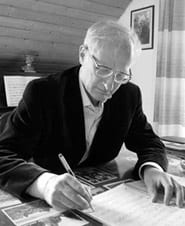 A series of concerts in will inaugurate Germany’s Lutosławski Year 2013 celebrations. The concert program has been created by conductor Andrey Boreyko in cooperation with the Polish Institute in Dusseldorf.
A series of concerts in will inaugurate Germany’s Lutosławski Year 2013 celebrations. The concert program has been created by conductor Andrey Boreyko in cooperation with the Polish Institute in Dusseldorf.
From January 11-14, the Düsseldorfer Symphoniker performs the world premiere of Krzysztof Meyer’s Chansons d’un rêveur solitaire as well as Witold Lutosławski’s Concerto for Orchestra, along with and two compositions from Ravel: Le tombeau de Couperin and Pavane pour une infante défunte. The ensemble is conducted by Andrzej Boreyko, with soprano Claudia Barainsky singing the solo.
More of Lutosławski’s music is played on January 12, including the Two Etudes for Piano and Paganini Variations, performed by the German-based Ensemble Différance. Other works include: Frank Zabel’s Concertino for Two Pianos and Percussion, Stefan Thomas’ New work for piano, percussion and electronics, and Béla Bartók’s Sonata for Two Pianos and Percussion. The concert on January 12 is preceded by a meeting with composer/ musicologist Krzysztof Meyer and musicologist Danuta Gwiazdalanka regarding their two-volume monograph on Lutosławski, entitled Droga do dojrzałości [The Way to Maturity] and Droga do mistrzostwa [The Way to Mastery], which will be published in Germany in 2013.
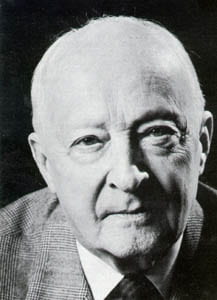 Krzysztof Meyer was born in Kraków in 1943. He took up the piano at the age of 5, and started composition studies in 1954, when he was 11, under the guidance of Stanisław Wiechowicz. Following Wiechowicz’s death, Meyer completed his diploma in 1965, under Krzysztof Penderecki, and undertook courses abroad, most notably with Nadia Boulanger (1964, 1966, and 1968) in Paris. In Warsaw he became a private pupil of Witold Lutosławski.
Krzysztof Meyer was born in Kraków in 1943. He took up the piano at the age of 5, and started composition studies in 1954, when he was 11, under the guidance of Stanisław Wiechowicz. Following Wiechowicz’s death, Meyer completed his diploma in 1965, under Krzysztof Penderecki, and undertook courses abroad, most notably with Nadia Boulanger (1964, 1966, and 1968) in Paris. In Warsaw he became a private pupil of Witold Lutosławski.
Meyer’s Symphony No. 1, his first publically performed work, was premiered in Kraków in 1964 when the composer was 21. He made his debut at the Warsaw Autumn Festival in 1965 while still a student, as the youngest composer in the festival’s history.
In early compositions such as String Quartets Nos. 1–4 and Symphonies Nos. 1–3, Meyer experimented with unconventional sounds typical of Polish avant-garde music in the 1960s. He used the twelve-tone technique, albeit freely, as well as aleatoric technique and collage. These means of expression appear in his first opera, Cyberiada, with a libretto based on the Stanisław Lem novel The Cyberiad. The manuscript of Cyberiada is housed in the Manuscript Collection of the Polish Music Center. Meyer’s later work reflects his interest in tradition, with titles such as “string quartet”, “sonata”, “concerto”, and “symphony” indicating this aesthetic trait.
Friday, Jan. 11, 8 pm | Sunday, Jan. 13, 11 am | Monday, Jan. 14, 8 pm
Düsseldorfer Symphoniker with Andrey Boreyko & Claudia Barainsky
Tonhalle, Ehrenhof 1, 40479 Düsseldorf
polnisches-institut.de
Saturday, Jan. 12, 8 pm
Ensemble Différance performs
Tonhalle, Ehrenhof 1, 40479 Düsseldorf
polnisches-institut.de
[Sources: press release via culture.pl, polnisches-institut.de, lutosławski.org.pl]
Lutosławski with Salonen, Zimerman and the Philharmonia
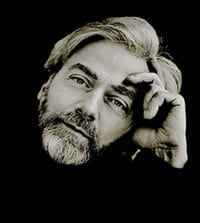 On January 30, 2013, conductor Esa-Pekka Salonen will lead the Philharmonia Voices and pianist Krystian Zimerman (right) in a program of Lutoslawski and Ravel at the Royal Festival Hall in London.
On January 30, 2013, conductor Esa-Pekka Salonen will lead the Philharmonia Voices and pianist Krystian Zimerman (right) in a program of Lutoslawski and Ravel at the Royal Festival Hall in London.
The concert opens the London celebrations for the exact centenary of Lutoslawski’s birth with his Musique Funèbre, which the composer himself described as “my first word in a new language.” The Piano Concerto is, by comparison, one of Lutoslawski’s last completed works, a glorious summation of his creative achievement that belongs in the great tradition of Romantic piano concertos stretching all the way back to Chopin and Liszt. There is also a rare opportunity to hear Ravel’s complete ballet score, Daphnis et Chloé, which shares with Lutoslawski’s distinctive soundworlds a meticulous attention to detail that is ravishing and utterly magical.
January 30, 2013 | 7:30pm
Salonen, Zimerman perform Lutosławski in London
Royal Festival Hall, London
[Source: woven-words.co.uk]
Wrocław Philharmonic Celebrates Lutosławski
The Philharmonic Orchestra in Wrocław, Poland will spend the latter part of January celebrating the Lutoslawski Centenary with special guest, pianist Garrick Ohlsson. On January 24, Ohlsson will partner with the Wrocław-based Lutosławski Quartet (Jakub Jakowicz and Marcin Markowicz – violins, Artur Rozmysłowicz – viola, and Maciej Młodawski – cello) to present Lutosławski’s String Quartet and Bartók’s Piano Quintet BB 33. On January 25, Ohlsson will join the Wrocław Phil with Jacek Kaspszyk – conductor and Aleksandra Pijarowska – recitation for a special concert of music by Lutosławski, Stravinsky and Ravel. Highlights of the program will be Lutosławski’s Fanfare for Louisville for wind instruments and percussion and his Piano Concerto. Then, during the following weeks, these performers will take the programs on the road to Warsaw, Berlin, Leipzig and Copenhagen.
January 24, 2013, 7:00 p.m.
Garrick Ohlsson / Lutosławski Quartet perform Lutosławski & Bartók
Wrocław Philharmonic Hall – Wrocław, Poland
January 25, 2013, 7:00 p.m.
Garrick Ohlsson / Wrocław Phil / Jacek Kaspszyk / Aleksandra Pijarowska perform Lutosławski, Stravinsky & Ravel
Wrocław Philharmonic Hall – Wrocław, Poland
January 28, 2013, 7:00 p.m.
Garrick Ohlsson / Wrocław Phil / Jacek Kaspszyk perform Lutosławski, Stravinsky & Ravel
Polish Radio Concert Hall, Warsaw, Poland (Łańcuch X Festival)
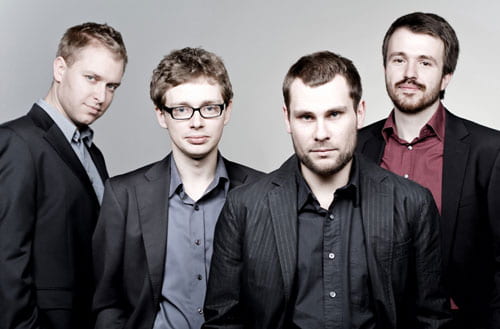 January 29, 2013, 7:00 p.m.
January 29, 2013, 7:00 p.m.
Garrick Ohlsson / Lutosławski Quartet perform Lutosławski & Bartók
Polish Radio Concert Hall, Warsaw, Poland (Łańcuch X Festival)
January 31, 2013, 8:00 p.m.
Lutosławski Quartet performs Lutosławski, Szymanowski & Markowicz
Konzerthaus, Berlin, Germany
February 1, 2013, 8:00 p.m.
Lutosławski Quartet performs Lutosławski, Szymanowski & Markowicz
MDR-Studio, Leipzig, Germany
February 3, 2013, 7:00 p.m.
Lutosławski Quartet performs Lutosławski, Szymanowski & Markowicz
Copenhagen, Denmark
Publications
A Guide to Witold Lutosławski’s Music—An Afterword
 Among the many eagerly-awaited publications to be released this year, Andrzej Chłopecki’s Przewodnik po muzyce Witolda Lutosławskiego. PostSłowie [A Guide to Witold Lutosławski’s Music—An Afterword] will also be introduced to the public. Commissioned by the Lutosławski Society especially for the centennial celebrations, this was Chłopecki’s last work which remained unfortunately unfinished upon his death on September 23, 2012. Chłopecki’s thorough analysis of Lutosławski’s music places his opus as crucial to the understanding of the twentieth century music.
Among the many eagerly-awaited publications to be released this year, Andrzej Chłopecki’s Przewodnik po muzyce Witolda Lutosławskiego. PostSłowie [A Guide to Witold Lutosławski’s Music—An Afterword] will also be introduced to the public. Commissioned by the Lutosławski Society especially for the centennial celebrations, this was Chłopecki’s last work which remained unfortunately unfinished upon his death on September 23, 2012. Chłopecki’s thorough analysis of Lutosławski’s music places his opus as crucial to the understanding of the twentieth century music.
Lutosławski. 1913-2013
In January, the Lutosławski Society will release a 300-page album entitled Lutosławski. 1913-2013, prepared by Elżbieta Markowska. It contains Lutosławski’s comments, reminiscences of his family and friends, and numerous photographs illustrating his life and times. This publication meets the goal of presenting a more complete picture of Lutosławski as a musician and a private person that is based on private family archives and collections housed by many different institutes and institutions, including that of the Polish Radio.
[Source: press release via Witold Lutosławski Society]
PMC News
Recent Gifts to the PMC (Nov-Dec 2012)
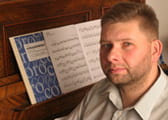 Paweł Łukaszewski, a prominent composer who was the 2011 Paderewski Lecturer at USC, continues to share his catalogue of compositions and sound recordings with the Polish Music Center. His latest choral work, Daylight Declines (2013), pays homage to the celebrated choral work Już się zmierzcha by Wacław z Szamotuł (ca. 1520- ca. 1560) with the original Polish text in a contemporary English translation.
Paweł Łukaszewski, a prominent composer who was the 2011 Paderewski Lecturer at USC, continues to share his catalogue of compositions and sound recordings with the Polish Music Center. His latest choral work, Daylight Declines (2013), pays homage to the celebrated choral work Już się zmierzcha by Wacław z Szamotuł (ca. 1520- ca. 1560) with the original Polish text in a contemporary English translation.
In recent weeks Paweł Łukaszewski also donated to the PMC three CDs published on the DUX label in their Musica Sacra series dedicated to his music: DUX 0356, DUX 0367, and DUX 0440. For more details on these albums, see the discography section below.
Paweł Łukaszewski’s Musica Sacra Publishing continues to issue medals commemorating various Polish composers and the PMC is fortunate to receive from Mr. Łukaszewski the latest additions of the so-called “25 Opuses” limited edition coins dedicated to Marian Sawa (1937-2005), Wojciech Łukaszewski (1936-1978), Roman Maciejewski (1910-1998), and Marek Jasiński (1949-2010).
Dariusz Tabisz, a young and enthusiastic conductor based in Poznań, has presented the PMC with the Christ is Born 4 Us, a CD recording of “Christmas Carols for the new millennium.” Performed by the Nova Gaudia vocal ensemble and accompanied by the Youth Chamber Orchestra led by Mr. Tabisz, the disc was co-produced by the Adam Mickiewicz University in Poznań and the City of Poznań. The recording presents a variety of arrangements by Jacek Sykulski of Christmas standards by European and American and other Christmas-themed songs from the world music repertoire.
 Andrzej Sitarz, Deputy Director of the Paderewski Institute of Musicology at the Jagiellonian University has presented the PMC three fascinating brochures relating to the centennial celebrations of musicology held throughout 2011 at this prestigious university. The brochure 100 lat muzykologii krakowskiej – 1911-2011 [One Hundred Years of Musicology in Kraków] contains articles about the history of musicology at the Jagiellonian, lists its directors, programs of studies, publications, and describes institutes devoted to studies of Paderewski and Lutosławski, among others. Housed in within in the neo-classical Pusłowski Palace in the heart of old Kraków, the Institute has sponsored a number of concerts, including a special evening of Lieder by Kraków-based musicologists, including Zdzisław Jachimecki, Włodzimierz Poźniak, Julisz Łuciuk, Bugusław Schaeffer, Jakub Polaczyk, and Michał Papara. This publication has extensive biographies of the musicologists whose works were heard at the Pusłowski Palace on 24 November 2011. Finally, the last of the three brochures donated by Director Sitarz to PMC is a catalogue of exhibit of documents dedicated to the memory of Zdzisław Jachimecki (1882-1953), the founder of the Department of Musicology at the Jagiellonian with several excellent articles about Jachimecki’s life, studies, and career in music.
Andrzej Sitarz, Deputy Director of the Paderewski Institute of Musicology at the Jagiellonian University has presented the PMC three fascinating brochures relating to the centennial celebrations of musicology held throughout 2011 at this prestigious university. The brochure 100 lat muzykologii krakowskiej – 1911-2011 [One Hundred Years of Musicology in Kraków] contains articles about the history of musicology at the Jagiellonian, lists its directors, programs of studies, publications, and describes institutes devoted to studies of Paderewski and Lutosławski, among others. Housed in within in the neo-classical Pusłowski Palace in the heart of old Kraków, the Institute has sponsored a number of concerts, including a special evening of Lieder by Kraków-based musicologists, including Zdzisław Jachimecki, Włodzimierz Poźniak, Julisz Łuciuk, Bugusław Schaeffer, Jakub Polaczyk, and Michał Papara. This publication has extensive biographies of the musicologists whose works were heard at the Pusłowski Palace on 24 November 2011. Finally, the last of the three brochures donated by Director Sitarz to PMC is a catalogue of exhibit of documents dedicated to the memory of Zdzisław Jachimecki (1882-1953), the founder of the Department of Musicology at the Jagiellonian with several excellent articles about Jachimecki’s life, studies, and career in music.
In late November 2012, Anna Giermek-Briscoe from Pacific Azusa University donated a large collection of books and scores, mainly connected to Karol Szymanowski. We’ve just finished processing the gift and are happy to add the following items to our collection:
I. BOOKS (Author/Title/Publisher):
- Krystyna Dąbrowska / Karol z Atmy / Krajowa Agencja Wydawnicza, Warszawa 1982
- Krzysztof Meyer / Szostakowicz / PWM 1986
- Tadeusz Marek / Schubert / PWM 1988
- Stefania Łobaczewska / Beethoven / PWM 1984
- Teresa Chylińska, Ed. / Zakopiańskie dni Karola Szymanowskiego 1894-1936 / PWM 1986
- Teresa Chylińska, Ed. / Między kompozytorem i wydawcą—korespondencja Karola Szymanowskiego z Universal Edition / PWM 1978
- Stanisława Korwin-Szymanowska / How to Sing the Works by Karol Szymanowski / PWM Edition (1957?)
- Jarosław Iwaszkiewicz / Pisma muzyczne / Czytelnik 1983
- Józef Kański / Chopin i jego ziemia / Interpress 1979
- Jerzy Waldorff / Serce w płomieniach—opowieść o Karolu Szymanowskim / Krajowa Agencja Wydawnicza 1982
- Kornel Michałowski, Ed. / Karol Szymanowski—Pisma literackie (Vol. 1) / PWM 1984 [with dedication by Jerzy Waldorff]
- Teresa Chylińska, Ed. / Karol Szymanowski—Pisma literackie (Vol. 2) / PWM 1989
- Teresa Chylińska, Ed. / Karol Szymanowski—korespondencja. Tom 1, 1903-1919 / PWM 1982
- Teresa Chylińska / Szymanowski / Twayne Publishers & The Kosciuszko Foundation, New York 1973 [English]
- Teresa Chylińska / Szymanowski / PWM 1981 [English]
- Stanisław Olędzki / Polskie instrumenty ludowe / PWM 1978
- Zdzisław Sierpiński, Ed. / O Karolu Szymanowskim—Antologia / Interpress 1983
- Zdzisław Sierpiński, Ed. / Karol Szymanowski—An Anthology / Iinterpress 1986
II. BROCHURES & CATALOGUES
- Elżbieta Jasińska-Jędrosz / Rękopisy utworów muzycznych Karola Szymanowskiego—Katalog / Wydawnictwa Uniwersytetu Warszawskiego 1983
- Karol Szymanowski [Catalogue of Works] PWM (undated) [English]
- Włodzimierz Kotoński [Catalogue of Works] PWM (undated) [English]
- Szymanowski Centennial /Friends of Polish Music, USC 1982
- Various authors / Oddziaływanie Szymanowskiego na śląską kulturę muzyczną / Music Academy Katowice 1980
III. SCORES
- Karol Szymanowski: Gesamt Ausgabe/Complete Edition, Vol. 2: Symphony No. 3—Song of the Night, Op. 27 & Symphonie-Concertante, Op. 60 / PWM Edition, Kraków & Universal Edition, Wien 1985
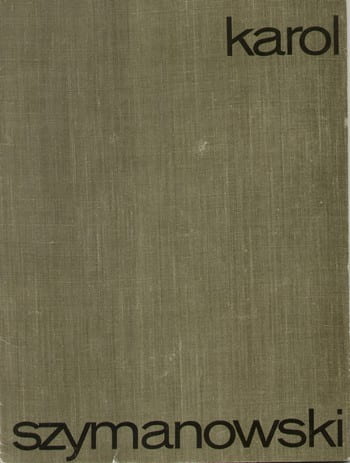 Karol Szymanowski: Gesamt Ausgabe/Complete Edition, Vol. 4: Cantatas / PWM Edition, Kraków & Universal Edition, Wien 1979
Karol Szymanowski: Gesamt Ausgabe/Complete Edition, Vol. 4: Cantatas / PWM Edition, Kraków & Universal Edition, Wien 1979- Karol Szymanowski: Gesamt Ausgabe/Complete Edition, Vol. 5: Songs with Orchestra / PWM Edition, Kraków & Universal Edition, Wien 1978
- Karol Szymanowski: Gesamt Ausgabe/Complete Edition, Vol. 9: Works for Violin and Piano / PWM Edition, Kraków & Universal Edition, Wien 1978
- Karol Szymanowski: Gesamt Ausgabe/Complete Edition, Vol. 12: Six Kurpian Songs / PWM Edition, Kraków & Universal Edition, Wien 1982
- Karol Szymanowski: Gesamt Ausgabe/Complete Edition, Vol. 14: King Roger, Op. 46 / PWM Edition, Kraków & Universal Edition, Wien 1973
- Karol Szymanowski: Dzieła, Tom 1: Uwertura koncertowa na orkiestrę, Op. 12 / PWM 1968
- Karol Szymanowski: Dzieła, Tom 6: Koncert na skrzypce i orkiestrę, Op. 51 / PWM 1975
- Karol Szymanowski: Dzieła, Tom 8: Veni Creator, Op. 57 & Litania do Marii Panny, Op. 59 / PWM 1975
- Karol Szymanowski: Dzieła, Tom 9: Agave, Op. 38 & Demeter, Op. 37 bis / PWM 1975
- Karol Szymanowski: Dzieła, Tom 10: Pieśni z orkiestrą, Op. 18, Op. 26, Op. 31, Op. 42, Op. 46 bis / PWM 1977
- Karol Szymanowski: Dzieła, Tom 11: Kwartety smyczkowe, Op. 37 & Op. 56 / PWM 1976
- Karol Szymanowski: Dzieła, Tom 13: Utwory fortepianowe, Op. 1, Op. 3, Op. 4, Op. 10, Op. 14, Op. 33, Preludium i fuga cis-moll / PWM 1982
- Karol Szymanowski: Dzieła, Tom 16: Utowry fortepianowe, Op. 50, Op. 62, 4 Tańce polskie, Walc romantyczny / PWM 1982
- Karol Szymanowski: Dzieła, Tom 19: Pieśni, Op. 24, Op. 31, Op. 32, Op. 41, Op. 42, Op. 54, Grób Hafiza, Op. Posth., Samotny księżyc, Op. 31 nr. 1 [a], Dans les prés fleuris / PWM 1981
- Karol Szymanowski: Dzieła, Tom 20: Pieśni, Op. 46 bis, Op. 48, Op. 49, Op. 58, Vocalise-Étude, Idom se…, Pieśni polskie, O zwiedzionym żołnierzu, Do dziewczyny, Wyszywała raz Hanka / PWM 1984
- Karol Szymanowski: Dzieła, Tom 24: Harnasie, Op. 55 / PWM 1985
- Karol Szymanowski: 4 Etiudy na fortepian, Op. 4 / PWM 1952
- Karol Szymanowski: I Sonata fortepianowa, Op. 8 / PWM 1979
- Karol Szymanowski: II Sonata fortepianowa, Op. 21 / PWM 1976
- Karol Szymanowski: Metopy na fortepian, Op. 29 / PWM 1979
- Karol Szymanowski: Maski na fortepian, Op. 34 / PWM 1979
- Karol Szymanowski: Symphonie-Concertante, Op. 60 [2-piano reduction / PWM 1970
As always, we are most grateful to all our donors for their generous contributions. Dziękujemy!
News
Premieres at ‘Brand New Music’
On December 11-14, 2012 at the Karol Szymanowski Academy of Music, the “Brand New Music” 2012 Festival was held in Katowice. Organized jointly by the Academy and the Silesian branch of the Polish Composers’ Union [ZKP], the Festival featured works by several generations of composers—from students of the Academy of Music in Katowice and the University of Louisville, through outstanding graduates, to great masters. The four-day Festival included three concerts, workshops and meetings with invited guests, all fostering a broad discussion about the music of today.
The most important parts of the Festival were the meeting with special guest Louis Andriessen, one of today’s most recognized composers and a pianist, originating in the Netherlands, and the premiere of commissioned works. The works commissioned for the 2012 Festival were Chatayu by Dobromiła Jaskot (above right), Santa, santa Erotica! by Karol Nepelski (above left), and Motions, Stases by Krzysztof Wołek (above center), and were presented during the final concert alongside the Polish premiere of Andriessen’s La Giro.
The concerts were performed by the renowned ensemble Orkiestra Muzyka Nowa [OMN], under the baton of artistic director Szymon Bywalec, with soloists Monica Germino – violin and Małgorzata Walentynowicz – piano.
[Sources: am.katowice.pl, katowice.gdzieco.pl, zkp.org.pl]
Duchnowski World Premiere
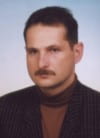 A new sacred work by Grzegorz Duchnowski, entitled Missa de Angelis, was premiered in December 9th 2012, at 7:30 pm in Church of The Blessed Virgin Mary in Mińsk Mazowiecki. Duchnowski’s work was performed by Dorota Szczepańska (soprano), the Mińsk Society of Music’s Chamber Choir and Unplugged Orchestra conducted by Michał Śmigielski.
A new sacred work by Grzegorz Duchnowski, entitled Missa de Angelis, was premiered in December 9th 2012, at 7:30 pm in Church of The Blessed Virgin Mary in Mińsk Mazowiecki. Duchnowski’s work was performed by Dorota Szczepańska (soprano), the Mińsk Society of Music’s Chamber Choir and Unplugged Orchestra conducted by Michał Śmigielski.
Set in five parts, Missa de Angelis is scored for soprano, choir, string orchestra and percussion. The text of the piece is based on the liturgical Order of the Mass. Stylistically, Grzegorz Duchnowski’s composition refers back to the medieval Kyriale Romannum.
This composition was written as part of the “Collections” section of the “Commissions for Composers” program implemented by the Institute of Music and Dance.
[Source: imit.org.pl, unplugged-orchestra.pl]
Vars World Premiere In Jelenia Góra
 At the inspiration of conductor Dariusz Tabisz, the Jelenia Góra Philarmonic Orchestra celebrated Polish Independence Day with the world premiere of the Sonatina for Orchestra by Henryk Wars on November 9, 2012. Also known in the US as Henry Vars, the composer spent World War II as a band leader with the reconstituted Polish Army abroad and then came to Hollywood, where he built a successful musical career writing such popular scores as Flipper (TV) and Seven Men from Now (film).
At the inspiration of conductor Dariusz Tabisz, the Jelenia Góra Philarmonic Orchestra celebrated Polish Independence Day with the world premiere of the Sonatina for Orchestra by Henryk Wars on November 9, 2012. Also known in the US as Henry Vars, the composer spent World War II as a band leader with the reconstituted Polish Army abroad and then came to Hollywood, where he built a successful musical career writing such popular scores as Flipper (TV) and Seven Men from Now (film).
Lesser known are Wars’ compositions for the concert stage. The manuscripts of these compositions were found after the composer’s death and many of them were donated by his late wife Elizabeth to the Polish Music Center in 2005.
The manuscript of the Sonatina, however, is held by the Library of Poznań University. Written in the 1950s, Wars’ Sonatina was dedicated to his friend and fellow composer Maurice Ravel. Conductor Dariusz Tabisz shared the following reflections about the piece and its belated premiere:
The Sonatina is a magnificent composition with three contrasting movements that were warmly received by the orchestra and the public. The first movement shines with ever-changing impressionistic colors, somewhat like Debussy’s La Mer. The second movement is quite serious and majestic with beautiful solo passages, but in a typical fashion for Wars, it has a light touch in approaching a solemn theme. The third movement is brilliant with a superb final culmination and its style is clearly jazz-inspired. It’s almost impossible to believe that nobody has performed this piece all these years.
I was quite surprised by the great enthusiasm of the Jelenia Gora Orchestra—it’s an excellent and lively ensemble which has great potential.
Also on the program for the evening were: Aleksander Tansman – Musique de cour, Mieczysław Karłowicz – Serenade for strings, Op. 2, and Zygmunt Noskowski – Symphonic Poem “Steppe”, Op. 66
[Sources: jgfakty.pl, bogatynia.pl]
Musica Sacra 2013
 The Musica Sacra Institute in Warsaw and the Gaude Mater International Festival of Sacred Music in Częstochowa present the 9th International Composers Competition “Musica Sacra” 2013. Co-organizers of the Competition include: Jasna Góra Monastery, Gaude Mater Society of Friends, Erzbistum Köln, Trinity College Choir of Cambridge, Jauna Muzika Vilnius Municipal Choir, and the Polish Chamber Choir of Gdańsk. The 2013 Competition Jury members are: Marian Borkowski – Poland, Eriks Ešenvalds – Latvia, Stephen Layton – Great Britain, Jan Łukaszewski – Poland, and Richard Mailänder – Germany.
The Musica Sacra Institute in Warsaw and the Gaude Mater International Festival of Sacred Music in Częstochowa present the 9th International Composers Competition “Musica Sacra” 2013. Co-organizers of the Competition include: Jasna Góra Monastery, Gaude Mater Society of Friends, Erzbistum Köln, Trinity College Choir of Cambridge, Jauna Muzika Vilnius Municipal Choir, and the Polish Chamber Choir of Gdańsk. The 2013 Competition Jury members are: Marian Borkowski – Poland, Eriks Ešenvalds – Latvia, Stephen Layton – Great Britain, Jan Łukaszewski – Poland, and Richard Mailänder – Germany.
The competition is open to composers of any nationality, up to 35 years old (on 31 Dec 2013). Compositions shall be written for unaccompanied mixed choir (maximum of 16 voices) set to a Latin text. Duration of the composition: 3–10 minutes. More than one score per composer is permitted (maximum three compositions). Submitted compositions must be unpublished, should not have been previously performed in public, and should also not have been awarded a prize at any other competition. The organizers reserve the rights for the first performance of the prize-winning compositions.
The following prizes will be awarded:
- 1st Prize: €2.000, first performance and broadcast during The “Gaude Mater” International Festival of Sacred Music 2013 in Częstochowa and 3 other performances: in Cambridge – by Trinity College Choir Cambridge directed by Stephen Layton, in Vilnius – by the Jauna Muzika Vilnius Municipal Choir directed by Vaclovas Augustinas, and in Gdańsk by the Polish Chamber Choir directed by Jan Łukaszewski.
- 2nd Prize: €1.500, first performance and broadcast during The “Gaude Mater” International Festival of Sacred Music 2013 in Częstochowa and in Gdańsk by the Polish Chamber Choir directed by Jan Łukaszewski.
- 3rd Prize: €1.000, first performance and broadcast during The “Gaude Mater” International Festival of Sacred Music 2013 in Częstochowa and in Gdańsk by the Polish Chamber Choir directed by Jan Łukaszewski.
In the case of ex-aequo, the prize will be split in two parts. The Jury reserves the right not to award a prize. The decision of the Jury is final.
All scores must be submitted anonymously by January 31, 2013. The postmark is decisive. Results will be announced by the end of February 2013. For submission details and fees, please visit www.competition.waw.pl. Any questions may be directed to competition@musicasacra.com.pl.
[Sources: press release, competition.waw.pl]
Musica Moderna In Łódź
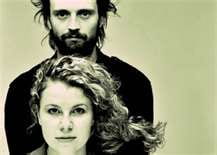 The 61st session of Musica Moderna—the contemporary music festival organized by the Bacewicz Music Academy in Łódź—took place on December 3-8. The ensembles ElettroVoce [Agata Zubel (voice/composition), Cezary Duchnowski (piano/composition)] and Kwartludium [Dagna Sadkowska (violin), Michał Górczyński (clarinet, bass clarinet), Paweł Nowicki (percussion), Piotr Nowicki (piano)], as well as composers from Łódź and laureates of the Bacewicz Composers Competition were this year’s main presenters.
The 61st session of Musica Moderna—the contemporary music festival organized by the Bacewicz Music Academy in Łódź—took place on December 3-8. The ensembles ElettroVoce [Agata Zubel (voice/composition), Cezary Duchnowski (piano/composition)] and Kwartludium [Dagna Sadkowska (violin), Michał Górczyński (clarinet, bass clarinet), Paweł Nowicki (percussion), Piotr Nowicki (piano)], as well as composers from Łódź and laureates of the Bacewicz Composers Competition were this year’s main presenters.
 The 61st session began with a concert of young performers presenting works by young composers (all current or former students of the Academy in Łódź). The concert demonstrated the growing interest in contemporary music among the students and their commitment to new music, as well as the fact that the Festival Musica Moderna is still a vital and positive force.
The 61st session began with a concert of young performers presenting works by young composers (all current or former students of the Academy in Łódź). The concert demonstrated the growing interest in contemporary music among the students and their commitment to new music, as well as the fact that the Festival Musica Moderna is still a vital and positive force.
Programs of the Festival concerts also presented the artistic approach of professors of the Academy in Łódź. One of the biggest attractions of the Festival was the presentation of the Electronic Music Computer Studio, featuring special guest Tadeusz Wielecki—double bass player, composer, and the Director of Warsaw Autumn Festival.
ElletroVoce and Kwartludium—both significant Polish ensembles specializing in contemporary music performance—were also guests of the session. Within the Festival was a concert of contemporary music called “contem.ucha,” in which Kwartludium presented repertoire by young composers from Łódź with the Artur Rubinstein Philharmonic in Łódź.
The final concert of the 4th Grażyna Bacewicz International Composers Competition was another concert presented, and an important event in the Rubinstein Philharmonic in Łódź.
A traditional and essential part of the annual Musica Moderna Festival is a concert performed by students of lower music schools in Łódź. Young generation of musicians performed the contemporary polish music at one of their schools – the Hernyk Wieniawki 1st and 2nd degree General Lower Music School in Łódź.
[Source: polmic.pl, amuz.lodz.pl]
Kallay Plays Żebrowski
 On January 17, pianist Aron Kallay will return to the material he premiered during the “Polish-Lithuanian Connection” concert of the PMC Festival of Premieres last March (pictured above). As a part of the Music on Argyle series, he will perform UN-intermezzi by Veronika Krausas and Five Piano Preludes by Marek Żebrowski.
On January 17, pianist Aron Kallay will return to the material he premiered during the “Polish-Lithuanian Connection” concert of the PMC Festival of Premieres last March (pictured above). As a part of the Music on Argyle series, he will perform UN-intermezzi by Veronika Krausas and Five Piano Preludes by Marek Żebrowski.
Kallay will share the stage with pianist Vicki Ray, with whom he will join in playing a two piano work entitled Rad by Enno Poppe. Ray will also play solo works by Sean Heim – In the Between and Bruce Reiprich – Flowing Waters Caress Fallen Petal.
Thursday, January 17, 2013 at 8:00 PM
Aron Kallay & Vicky Ray @Music on Argyle
The Russian Hall
2041 Argyle Avenue, Los Angeles, CA 90068
Tickets: $10 (cash only at the door; credit card for online ticket purchases only)
[Sources: press release, musiconargyle.org]
Live Klezmer Performance To Pola Negri Film
This wonderful and strange work is a story about Jews, but made by and for non-Jews. I wished to be the missing Jewish artistic collaborator who might bridge this gap by providing authentic sounds drawn from the collective Jewish soul. More than that, I felt my task was to use the soundtrack to clarify the story’s structure, and through the music to arouse in the viewer the profound emotions depicted in the film across a gulf of sensibility and time. – Alicia Svigals
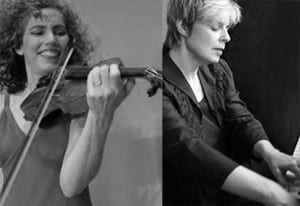 Starting on January 10 with a presentation at the 2013 New York Jewish Film Festival, the 1918 film The Yellow Ticket, starring the acclaimed Polish actress of the silent era Pola Negri, will appear with original music created by renowned klezmer fiddle revivalist, Alicia Svigals. This joint initiative of the Foundation for Jewish Culture and its New Jewish Culture Network marks the first feature length film composition by Svigals, who will perform in person with Canadian jazz pianist Marilyn Lerner at each of the screenings of this silent classic.
Starting on January 10 with a presentation at the 2013 New York Jewish Film Festival, the 1918 film The Yellow Ticket, starring the acclaimed Polish actress of the silent era Pola Negri, will appear with original music created by renowned klezmer fiddle revivalist, Alicia Svigals. This joint initiative of the Foundation for Jewish Culture and its New Jewish Culture Network marks the first feature length film composition by Svigals, who will perform in person with Canadian jazz pianist Marilyn Lerner at each of the screenings of this silent classic.
The Yellow Ticket took on bold themes for its day, touching upon social issues such as human trafficking, ethnic and religious prejudice, poverty and suicide. Despite being forced into prostitution by dire circumstances, Lea, the heroine, strives to pursue her professional career by any means necessary, enrolling in medical school in St. Petersburg. Negri’s sympathetic portrayal of Lea was one of her first films for Germany’s leading film studio, UFA, and was later released by Paramount Studios in 1922.
Since its founding in 1960, The Foundation for Jewish Culture (FJC) has been one of the most fundamental American institutions devoted to preserving Jewish cultural memory and an avid advocate for the importance of Jewish culture as a component of Jewish life. The FJC offers grants, recognition awards, networking opportunities and professional development services to artists and scholars in order to promote Jewish identity and culture by collaborating with cultural institutions, Jewish organizations, consortia, funders and many others.
[Source: polishculture-nyc.org]
Augustyn In Poland In January
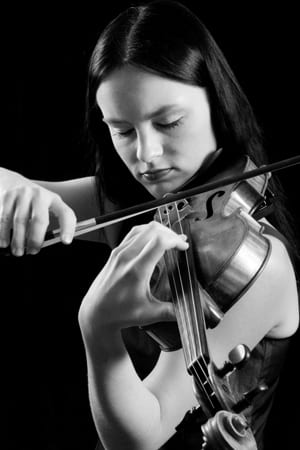 New York-based violinist Kinga Augustyn travels to Poland for concerts in January. She will be performing recitals with Wrocław-based pianist, Mirosław Gąsieniec, as well as her brother, guitarist Jakub Augustyn.
New York-based violinist Kinga Augustyn travels to Poland for concerts in January. She will be performing recitals with Wrocław-based pianist, Mirosław Gąsieniec, as well as her brother, guitarist Jakub Augustyn.
SATURDAY, JANUARY 7, 2012, 7 PM
New Year Charity Concert – Violin Recital with Piano and Guitar
Oratorium Marianum, Plac Uniniwersytecki 1, Wrocław, Poland
Info: www.tuwroclaw.com
SUNDAY, JANUARY 8, 2012, 5:30 PM
Violin Recital with Guitar
Liceum Urszulanek, Wrocław, Poland
Info: www.aktualnosci.ownlog.com
TUESDAY, JANUARY 10, 2012
New Year’s Concert
Wrocław Philharmonic Hall, Wrocław, Poland
Info: www.filharmonia.wroclaw.pl
Chopin FDN Concerts In January
 On January 12 and 13, the Chopin Foundation continues its “Chopin for All” FREE Concert Series with a piano recital by the American rising star of the piano, Steven Lin. This young recipient of a number of international awards, including Hilton Head and William Kapell International Piano Competitions, will play music by Chopin, Bach and Liszt.
On January 12 and 13, the Chopin Foundation continues its “Chopin for All” FREE Concert Series with a piano recital by the American rising star of the piano, Steven Lin. This young recipient of a number of international awards, including Hilton Head and William Kapell International Piano Competitions, will play music by Chopin, Bach and Liszt.
Then, on January 27 in collaboration with the Rosenstiel School of Marine and Atmospheric Science, the Chopin Foundation presents a concert and reception on the water. The recital will feature New York-based artists violinist Kinga Augustyn and pianist Jasna Popovic, performing music by Wieniawski, Chopin, Szymanowski, Bartók, Mozart, and Saint-Saëns.
Saturday, January 12, 2012 at 3:00 PM
“Chopin for All” Concert with Steven Lin, piano
Broward County Main Library, 100 S. Andrews Ave, Ft. Lauderdale
FREE
Sunday, January 13, 2012 at 3:00 PM
“Chopin for All” Concert with Steven Lin, piano
Granada Presbyterian Church, 950 University Drive, Coral Gables
FREE
Info: 305-868-0624 or www.chopin.org
January 27, 2013, 4 pm
Violin and Piano recital featuring Kinga Augustyn and Jasna Popovic
Rosenstiel School of Marine and Atmospheric Science, Key Biscayne, FL
Tickets: $35 Chopin Members $30
Info: 305-421-4061 or www.chopin.org
[Source: press release]
Awards
NEM Award For Penderecki
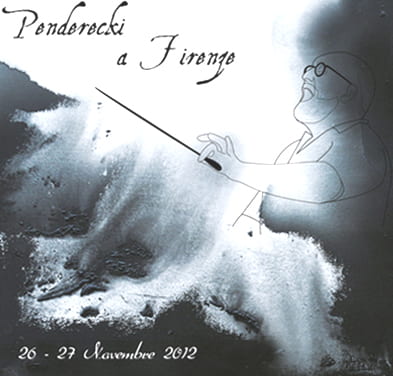 On November 26 in Florence, composer Krzysztof Penderecki received a prestigious award from the Italian Nuovi Eventi Musicali (NEM) association. The composer’s two-day visit to Florence, completed with concerts and masterclasses, was considered a great event. The presentation ceremony was held at the Sala del Buonumore [Hall of Good Humour] of the former Benedictine Convent, known as The Coenaculum of St Apollonia.
On November 26 in Florence, composer Krzysztof Penderecki received a prestigious award from the Italian Nuovi Eventi Musicali (NEM) association. The composer’s two-day visit to Florence, completed with concerts and masterclasses, was considered a great event. The presentation ceremony was held at the Sala del Buonumore [Hall of Good Humour] of the former Benedictine Convent, known as The Coenaculum of St Apollonia.
Penderecki was introduced as one of the greatest living musical giants. Recently, Italian critics and newspapers wrote rave reviews of Penderecki’s joint recording with Radiohead rock guitarist Jonny Greenwood. The Polish composer also referred to this album in Florence: “Thanks to Radiohead I found a new audience at almost 80. This experience gave me a new life.”
The composer also recalled the times of Communist Poland. “They refused to give me a passport. I read in the paper about a competition, the award being a visit to the West. I composed three works under three different names and won everything. Thanks to this I could travel, also to Italy,” he said, after which he added: “I travelled around Italy during the nights, because I had no money for hotels.”
The NEM award has been conferred since 2006 to the greatest personalities of contemporary music and art.
[Source: beethoven.org.pl]
German Merit Award For Penderecka
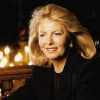 Music promoter Elżbieta Penderecka has received the Merit Cross on Ribbon of the Federal Republic of Germany, awarded by the German President for her long-term commitment to cooperation in the field of music between Poland and Germany. Mrs. Penderecka—a distinguished initiator and organizer of music events—was presented the distinction bythe Ambassador Von Fritsch of the Federal Republic of Germany to Poland. The ceremony, held on Monday November 12, 2012 at the German Embassy in Warsaw, was accompanied by a concert of cellist Valentin Radutiu and pianist Per Rundberg.
Music promoter Elżbieta Penderecka has received the Merit Cross on Ribbon of the Federal Republic of Germany, awarded by the German President for her long-term commitment to cooperation in the field of music between Poland and Germany. Mrs. Penderecka—a distinguished initiator and organizer of music events—was presented the distinction bythe Ambassador Von Fritsch of the Federal Republic of Germany to Poland. The ceremony, held on Monday November 12, 2012 at the German Embassy in Warsaw, was accompanied by a concert of cellist Valentin Radutiu and pianist Per Rundberg.
In his address, the Ambassador emphasized Elżbieta Penderecka’s services to Polish-German relations. “You have rendered great services particularly to music, and music has already done an infinite amount of good to our relations,” he said. Von Fritsch paid special attention to her activities as President of the Artistic Board for the European City of Culture celebrations in Kraków in 2000, and to her initiation of the annual Ludwig van Beethoven Easter Festival.
The Ambassador stressed that on many occasions Elżbieta Penderecka has invited to Poland outstanding German artists and ensembles, including Anne-Sophie Mutter, the Chor der Bamberger Symphoniker, the La Stagione Frankfurt early music orchestra, the Bundesjugendorchester, and the Deutsche Kammerorchester Berlin. “The relations between Poland and Germany have developed in various ways, but music is the area where understanding and agreement … is always possible, here and now,” said Penderecka after accepting the distinction.
The Order of Merit of the Federal Republic of Germany is the only federal decoration of Germany. It is a civil award.
[Source: beethoven.org.pl]
Discography
Premiere Recording of M. Małecki
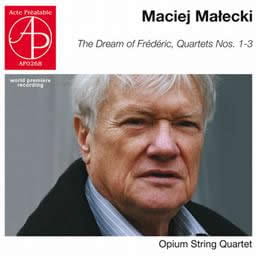 Maciej Małecki – The Dream of Frédéric, Quartets nos. 1-3
Maciej Małecki – The Dream of Frédéric, Quartets nos. 1-3
Maciej Małecki (b. 1940): The Dream of Frédéric (2010), String Quartet No. 1 (1994), String Quartet No. 2 (1997), String Quartet No. 3 (2012)
Opium String Quartet
Acte Préalable AP0268
In November 2012, Acte Préalable released a new CD of works by Maciej Małecki, recorded by the Opium String Quartet: Agnieszka Marucha and Anna Szalińska, violins; Magdalena Małecka, viola; and Olga Łosakiewicz-Marcyniak, cello. All of the works presented on the disc are world premiere recordings.
The Opium String Quartet (O.S.Q.) was founded in spring of 2004, and since the quartet has taken part in concerts, festivals and other artistic events throughout the country. For many years O.S.Q. has focused on the works of polish composers. With this newest recording, O.S.Q. presents the chamber works of Maciej Małecki, two of which—Sen Fryderyka [The Dream of Frédéric] and the 3rd String Quartet—were written for the ensemble.
“In Maciej Małecki’s music we can see very clearly his fascination with the classical form” writes Łukasz Kaczmarek in his essay attached to the album. “His music is contemporary but also based on the style of music from the beginning of the 20th century, always characterized by perfect structure and proportion. This kind of music is very logical and allows the composer to connect, interlock and penetrate diverse musical themes. This is also music which takes inspiration from romanticism but uses new composition techniques to create a contemporary masterpiece.”
[Source: acteprealable.com]
Łukaszewski on DUX
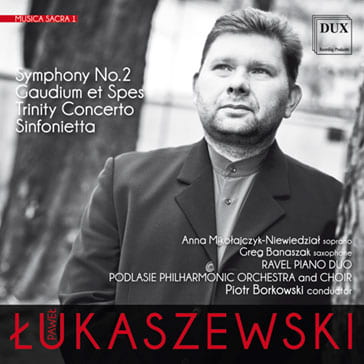 ŁUKASZEWSKI: Symphony No.2
ŁUKASZEWSKI: Symphony No.2
Paweł Łukaszewski (b. 1968): Gaudium et Spes for soprano, choir and symphonic orchestra (1997)*; Sinfonietta for string orchestra (2004)*; Trinity concerto for alto saxophone and string orchestra (2006)*; Adagietto for string orchestra (2009)*; Symphony No.2 “Festinemus amare homines“ for soprano, two pianos, choir and symphonic orchestra (2005, text: Father Jan Twardowski)*
Podlasie Philharmonic Orchestra and Choir in Białystok, Piotr Borkowski – cond.; Anna Mikołajczyk – soprano; Greg Banaszak – alto saxophone; Ravel Piano Duo: Agnieszka Kozło, Katarzyna Ewa Sokołowska
DUX 0356
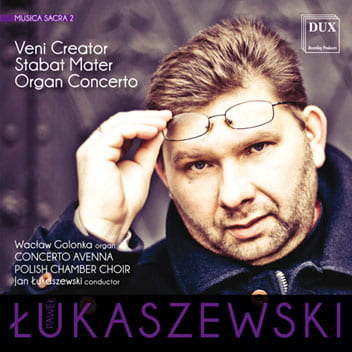 ŁUKASZEWSKI: Musica Sacra 2
ŁUKASZEWSKI: Musica Sacra 2
Psalmus 102 for a cappella mixed choir (2003)*; Souvenir I for organ (1999)*; Stabat Mater for three a cappella female choirs (1993)*; Offertorium for organ (2004); Hommàge a Edith Stein for a cappella mixed choir (2002); Concerto for organ and strings (1996); Veni Creator for two a cappella mixed choirs (2004); Icon for organ (2010)
Polish Chamber Choir; Schola Cantorum Gedanensis; Schola Cantorum Bialostociensis; Concerto Avenna; Jan Bartłomiej Bokszczanin, Jakub Garbacz, Wacław Golonka and Michał Markuszewski – organ; Jan Łukaszewski and Violetta Bielecka – cond.
DUX 0367
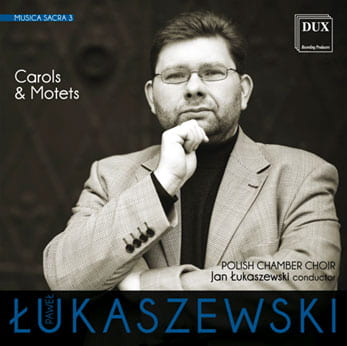 ŁUKASZEWSKI: Musica Sacra 3, Carols & Motets
ŁUKASZEWSKI: Musica Sacra 3, Carols & Motets
Angelus Domini for mixed choir (1992); Three Carols for mixed choir (1993, arr.)*; Three Carols for mixed choir (1992-99)*; Four Carols for female choir (1998, arr.)*; Three Carols for mixed choir (2001), words: Bożena Fabiani*; Two Christmas Motets for a cappella female choir (2000)*; Five Carols for a cappella female choir (2001, arr.)*; Candlemass Prayer for a cappella mixed choir (1988, lyrics: Kazimiera Iłłakowiczówna)*
Polish Chamber Choir; Schola Cantorum Gedanensis; Jan Łukaszewski– cond.
DUX 0440
* World premiere recordings
Below is an excerpt from the liner notes by Ewelina Sroczyńska for Musica Sacra 2 regarding the compositional style of Paweł Łukaszewski, who served as the PMC’s 2011 Paderewski Lecturer:
Among fans of contemporary music, the name of Paweł Łukaszewski is associated first and foremost with sacred music, both choral and vocal-instrumental. And even though his day-to-day activities focus on teaching, conducting and organization of music life, he feels above all that he is a composer with a vocation. He does not treat his profession as a craft. Composition is for him a way of life. As a composer Paweł Łukaszewski moves forward with the spirit of the times. He is fond of original and surprising concepts, and his music is the fruit of a never-ending search and exploration. Yet he does not like to write for the ‘bottom drawer’ and hence is doing his best to combine his own artistic plans with commissions and performances. In view of the fact that, in addition to writing music, he conducts, records, publishes and promotes it, he surely may be described if not as a ‘Renaissance man’ then as ‘a composer of the 21st century’.
There are many elements which should be taken into consideration in an attempt to define Paweł Łukaszewski’s style and compositional idiom. Most of them concern vocal and vocal-instrumental music, the genres which account for the lion’s share of his output.
In his vocal-instrumental works, Paweł Łukaszewski attaches particular attention to the text. Indeed, it is of fundamental significance to him. He uses mainly Latin religious texts of the post-Vatican II period, texts that are not over-used and yet are very meaningful. In his compositional work he follows the narrative layer of the text and attempts to convey its ideas in the music in a distinct and evocative way. In many cases the text is also the starting point for shaping the formal concept, which in all Łukaszewski’s works is well thought- out, polished, lucid and takes into account the psychology of perception. It comprises not only the work’s external shape but also such form-shaping elements as articulation, dynamics and metric and rhythmic patterns. Thanks to the associations between the musical material in the individual sections and the carefully planned climax, the form of Łukaszewski’s works is characterised by good proportions and inner cohesion.
Paweł Łukaszewski himself describes his sound language as ‘renewed’. In his works, he explores quasi tonal matter, commonly known nowadays as ‘neotonal’. He is not restricted by traditionally conceived harmony. He does not think functionally, rejects the motion of modulation and prefers distant combinations of key. His melodic writing is not based on the typical art of counterpoint but on interval steps characteristic of instrumental music. Even though he points to certain melodic, harmonic, textural and timbral elements present in many of his works (such as consonances of fifths and seconds or ninths and tritones, intervallic leaps in the melody, delayed entry in the parts, the breaking up of the melody into separate parts, the use of unison as a colouristic effect in both vocal and instrumental parts), he has never stopped exploring new sound and textural possibilities. These explorations have resulted in a far reaching reductionism, which is characteristic of his latest pieces. This simplification concerns all aspects of a musical work, its structure, sound material, performance forces, as well as its stylistic and aesthetic features. One of the examples is the harmonic material of the vocal parts which is dominated by unison-octave consonances and in some places confined to parlando and susurrandi effects.
In Łukaszewski’s latest, emotionally-charged compositions, the rhythmic factor is assigned primary importance. Coupled with frequent changes of metre, rhythm becomes a form-shaping element.
For Paweł Łukaszewski, compositional technique, while being indispensable in any act of creation, is a tool and not an end in itself. ‘The aim – the sacrum – begins where the compositional craft ends. An excessive concentration on technical matters destroys, as it were, the main component, which is much deeper than musical orthography’, he claims. Hence his preoccupation with questions relating to the depth of musical message and the charting of the path of explorations leading to the sacrum.
…
What label should be attached to Paweł Łukaszewski’s music? There is no easy answer to this question, because, for all his fascination with the music of Pärt, Tavener and Górecki, he does not feel associated with any group of composers or trend: ‘Neo-romanticism, neo-classicism – it is a thing of the past. The avant-garde, modernism, postmodernism – likewise. Much closer to my music is the neo-tonal trend represented by Pärt, Tavener, Górecki, perhaps Kilar. In Tavener’s music, Byzantine links are at the forefront. With Pärt one talks of the ‘tintinnabuli’ style. And what about Łukaszewski? I am not thrown into any group, such as the ‘Warsaw Autumn’ group, and I like it this way, because I value total freedom in art and I am constantly striving for creative freedom’.
…
‘One of the most talented composers of the young generation’, ‘a distinct, strongly-outlined individuality’, ‘a composer of rare talent’ – these are just some examples of the words of praise which Paweł Łukaszewski has earned from critics. They also stress that the composer’s media success is a reflection of the high artistic merit of his music. Now that Łukaszewski’s works are more and more often performed by internationally-renowned professional ensembles, music lovers are offered a chance to gain insights into his output. Łukaszewski’s wide-ranging compositional plans make it possible to look with optimism into the future and wait impatiently for his forthcoming pieces.
[Sources: press release, dux.pl]
Lipiński on DUX
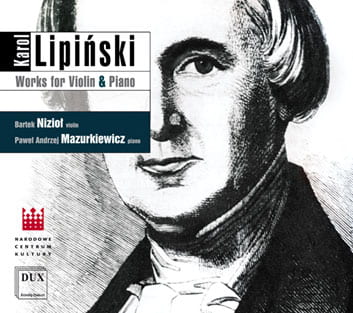 LIPIŃSKI: Works for Violin & Piano
LIPIŃSKI: Works for Violin & Piano
Karol Lipiński (1790-1861): Morceaux de salon pour violin avec accompagnement de piano arrangés sur des motifs de G. Rossini (Mainz, 1842); Trois Caprices pour violin solo op. 29; Fantasia and Variations on Sonnambula by Bellini, for violin & accompaniment, Op. 23; Trois Mélodies Italiennes de l’Opera Parisina par Vincenzo Bellini pour violin avec accompagnement de piano (Dresden, s.d.)
Bartłomiej Nizioł – violin, Paweł Mazurkiewicz – piano
DUX 0878
Below is an excerpt from the liner notes by Agnieszka Jeż (translated by Michał Kubicki) for Karol Lipiński: Works for Violin & Piano:
When profiling the Polish composer and violinist Karol LIPIŃSKI (1790-1861), [dubbed ‘a second Paganini’], the focus is usually placed on his skills as a performer. This was not, however, Lipiński’s only claim to fame. Apart from having an incredible virtuoso technique and interpretative insights, he had fine achievements as a teacher and, last but no[t] least, as a composer. Somewhat forgotten these days, Lipiński occupies an important place in Polish culture and deserves a broader recognition.
Karol Lipiński was born during the period of great virtuosos and established a prominent position for himself, contributing to the international scene and consolidating the Polish tradition within it, a tradition which was continued by Henryk Wieniawski. Lipiński came from a musical family. His father, who served as maestro of the instrumental ensemble the Court of the Potocki family in Radzyń Podlaski and taught music there, was his only music teacher. Karol quickly mastered the violin and cello, demonstrating supreme talent in both. The cello even became his first instrument at one stage, but after some time he devoted himself entirely to the violin, having brought to it some elements of cello technique, such as the strong vibrato, which was his main asset. The atmosphere at the Potocki Court was highly conducive to musical studies and learning in general, and so Karol and his brothers could play instruments, give public concerts, listen to good performances and interesting interpretations, as well as study foreign languages and gain some insights into the visual arts, notably painting. Furthermore, they had ample opportunity to benefit from what provincial life offered – the beauty of nature and the richness of the folk song heritage (whose echoes can be found in Lipiński’s compositions). They could also observe the hard toil of the local people working on the farm and in the forest. This idyll came to an end, however, after the Lipinski family moved to Lwów (now L’viv in Ukraine).
For the development of Karol’s musical talent, the change proved fortunate as the town was a major musical centre and home to many outstanding musicians. Lipiński was able to become acquainted with European artistic trends and listen to high-calibre musicians. Thanks to assistance from the cellist and composer, Ferdynand Krernes, he gained deeper insights into chamber music and presented his first compositions. From then onwards, he composed a great deal, mainly with himself in mind as performer. His incredible technical facility went hand in hand with the diligence and clarity of interpretation. He highly valued the faithful rendition of a composer’s concepts, trying to get as close as possible to the ideal of period-style performance, a postulate which is obvious today but was hardly popular at the time. Lipinski played and studied Bach’s music extensively, and this was a perfect school of compositional and performance discipline. This was of utmost importance in a world which went crazy about the so-called divine or diabolical artists, who attracted huge audiences with their technical brilliance bordering on circus-like displays. For Lipiński, however, what counted most were a composer’s intentions, immaculate precision and exquisite purity of intonation, which became his trademark. Virtuosity remained at the service of art, never vice versa.
[Sources: press release, dux.pl]
Performances
Concert Review – Lutosławski Centenary At LA Phil
By Gary Fitelberg
Lutosławski, LA Phil & Walt Disney Concert Hall –
A winning combination for an evening of beautiful classical music.
A special concert delight was heard by attentive audiences when the Los Angeles Philharmonic brought the legacy of music by Polish composer Witold Lutosławski to the Walt Disney Concert from November 30 to December 9, 2012. The series of tribute concerts was labeled the Lutosławski Centenary in commemoration with the 100th anniversary of birth of the composer during 1913 and was generously underwritten by the Adam Mickiewicz Institute as part of the Polska Music program.
 During the first weekend (Nov. 30 – Dec. 2), LA Phil Conductor Laureate Esa-Pekka Salonen led his former orchestra in works by Beethoven and Lutosławski. Beethoven’s compositions King Stephen Overture and Symphony No. 2 began and ended each concert performance, with Lutosławski’s Symphony No. 1 and Fanfare for Los Angeles Philharmonic highlighted in between as the meat of the sandwich. Salonen’s admiration for Lutosławski was clear at the commencement of the centenary concert series, when he hailed him as “one of the greatest composers of the twentieth century.”
During the first weekend (Nov. 30 – Dec. 2), LA Phil Conductor Laureate Esa-Pekka Salonen led his former orchestra in works by Beethoven and Lutosławski. Beethoven’s compositions King Stephen Overture and Symphony No. 2 began and ended each concert performance, with Lutosławski’s Symphony No. 1 and Fanfare for Los Angeles Philharmonic highlighted in between as the meat of the sandwich. Salonen’s admiration for Lutosławski was clear at the commencement of the centenary concert series, when he hailed him as “one of the greatest composers of the twentieth century.”
It was a quintessential Salonen program. He has paired Beethoven and Lutosławski before, for his “Beethoven Unbound” festival during the LA Phil’s 2004/05 season.
Lutosławski’s Symphony No. 1(1941-47), lasting 20-25 minutes, is in one continuous movement embodying two sections: a preparatory section and a development section with an epilogue. The composition was deterred from completion and subsequent concert performances due to Nazi Germany occupation and subsequent Communist rule in Poland. It was the first piece of music officially banned by the government of Stalinist Russia. Lutosławski and one of his champions, conductor Grzegorz Fitelberg—to whom the piece was dedicated—were undeterred, however. Fitelberg led the Grand Symphony Orchestra of the Polish Radio (WOSPR) in the premiere of the Symphony No. 1 in Katowice on April 6, 1948, followed by another performance on June 15 in Kraków.
These, alas, were the last performances for a very long time. In August 1949, following the lead of Stalin, Poland’s new communist government condemned modern music for the alleged crimes of cosmopolitanism, formalism and Western decadence. The new leaders sought to impose on Polish composers the Russian-inspired doctrine of socialist realism, calling for folklorism, 10th century harmony, and “positive social content.” Only in 1957, after the onset of the post-Stalinist thaw in Poland, was the score of Lutosławski’sSymphony No. 1 finally published. It was not performed again until 1958, ten years after its premiere.
The Lutosławski Centenary performance of Lutosławski’s Symphony No. 1 was recorded live during the Friday night concert—when the recording is released by Sony Classical, it will complete the set of Lutosławski’s four symphonies as performed by the LA Phil and Salonen.
Also performed during the first weekend of the series was Lutosławski’s Fanfare for Los Angeles Philharmonic, which received its first Los Angeles Philharmonic performance under the baton of Franz Welser-Möst during the 1994-95 season. This vibrant, exciting and explosive short piece for brass and percussion lasts a grand total of only one minute.
According to the LA Phil website:
In the last decade of his life, Lutosławski became closely associated with the Los Angeles Philharmonic. Most of his major works were presented in concert during that by the orchestra, the Philharmonic Institute Orchestra, or the New Music Group, often with the composer conducting and often in premiere performances. Highlights include the West Coast premiere of the Third Symphony on Esa-Pekka Salonen’s debut concerts with the Philharmonic in 1984 and the world premiere of the Fourth Symphony in February 1993, Lutosławski conducting. The recording of the Third Symphony by Salonen and the LA Phil won a Grammy, a Cecilia Prize, a Koussevitzky Award, and the 1986 Gramophone Award for Best Contemporary Record. Salonen and the Philharmonic also recorded the Fourth Symphony twice (for Sony and DG Concerts), as well as the Second Symphony, Les espaces du sommeil (with baritone John Shirley-Quirk), the Piano Concerto (with soloist Paul Crossley), and Chantefleurs et Chantefables (with soprano Dawn Upshaw).
They also recorded Fanfare for Los Angeles Philharmonic, which was the first in a series of fanfares written by distinguished composers in celebration of the Philharmonic’s 75th Anniversary Season. Brilliantly scored for brass and percussion, the Fanfare opens on a diminished fifth that immediately expands as a chromatic wedge through a major seventh in both directions. In one bar it reaches a typically Lutosławskian ad libitum passage, where the pitches and rhythms of each part are fully notated but unsynchronized. A chordal, metrically goosed passage roughly reverses the shape of the wedge, followed by another ad libitum section, this one static in pitch but rhythmically hyperactive. A syncopated tussle pitting trumpets and horns against trombones and tuba opens another musical wedge, reaching a fresh take on the first ad libitum section. In the final bars the brass confirm the arrival point with staccato chords built on seconds and sevenths that come to a rest on a major third – in context surprisingly consonant but characteristically both logical and ambiguous – while the timpani with three notes tersely summarize the main direction of the piece.
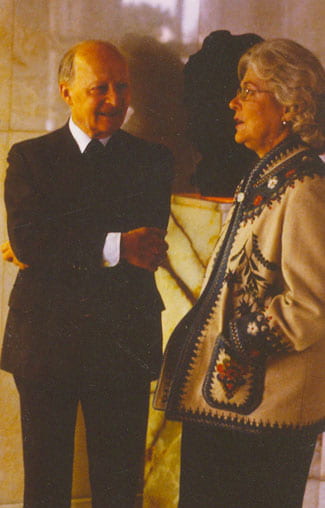 Among the gems in Lutosławski’s orchestra legacy are his settings of French Surrealist poet Robert Desnos’ verses written while in the Terezin concentration camp shortly before his death. Two of these vocal-orchestral settings were performed during the remaining concerts in the Lutosławski Centenary: Les espaces du sommeil (1975) and Chantefleurs et Chantefables (1990).
Among the gems in Lutosławski’s orchestra legacy are his settings of French Surrealist poet Robert Desnos’ verses written while in the Terezin concentration camp shortly before his death. Two of these vocal-orchestral settings were performed during the remaining concerts in the Lutosławski Centenary: Les espaces du sommeil (1975) and Chantefleurs et Chantefables (1990).
First recorded by the LA Phil with Salonen in 1994, Chantefleurs et Chantefables [Sung Flowers and Sung Fables] for soprano and orchestra was performed during the mid-week Green Umbrella concert on December 4, 2012. The performers were soprano Laura Claycomb with the LA Phil New Music Group with conductor Lionel Bringuier. According to Mark Swed, music reviewer for the Los Angeles Times, this program tied the past to the present as it strolled through the history between Lutosławski and the Phil:
There were also works by the orchestra’s conductor laureate Esa-Pekka Salonen and its former consulting composer Steven Stucky, both of whom were close to and influenced by Lutoslawski. The evening’s conductor was the L.A. Phil’s resident conductor Lionel Bringuier, who was mentored by Salonen and who has just been appointed the next music director of the Zurich Tonhalle Orchestra. It was a family affair, Lutoslawski passed from generation to generation, revealing just how much the composer meant to this orchestra.
In addition to the performance of Chantefleurs et Chantefables, which soprano Laura Claycomb sang beautifully, the mid-week performance also included Lutosławski’s Partita for violin and piano. The Partita was composed in the autumn of 1984 at the request of the St. Paul Chamber Orchestra for Pinchas Zuckerman and Marc Neikrug. On the program, the Partita and Chantefleurs surrounded two compositions by Lutosławski aficionados: Steven Stucky (Ad Parnussum) and Esa-Pekka Salonen (Homunculos). An authority on Lutosławski, Steven Stucky wrote the seminal biography Lutosławski and His Music.
The final weekend of the Lutosławski Centenary concerts (December 7-9, 2012) brought Salonen back to the conductor’s podium as well as the program page. The concerts opened with the West Coast premiere of Salonen’s composition Nyx followed by Schuman’s Piano Concerto, featuring pianist David Fray in his Disney Hall debut. The program concluded with Lutosławski’s “surrealist vocal nocturne,” Les espaces du sommeil, featuring American baritone Gerard Finley, and Tchaikovsky’s Francesca da Rimini.
Witold Lutosławski relayed the following story regarding the genesis of Les espaces du sommeil:
In December 1974 in Warsaw, after a recital which he had given with Sviatoslav Richter, Dietrich Fischer-Dieskau asked me if I had ever composed anything for baritone. I have always been an admirer of his and the prospect of hearing my music performed by that outstanding artist was a tremendous stimulus to me. I put aside all other work and devoted nearly the whole of 1975 to composing Les espaces du sommeil, the text being the poem by Robert Desnos. The first performance took place in Berlin on 12 April 1978 when I conducted the Berlin Philharmonic Orchestra and the soloist was Dietrich Fischer-Dieskau, to whom the work is dedicated.
The Lutosławski Centenary series revealed a winning combination—Lutosławski, LA Phil and Walt Disney Concert Hall as the perfect venue for Polish classical music.
Gary Fitelberg is a musicologist, music critic and historian.
Further reviews for the Lutosławski Centenary concert series can be found at www.bachtrack.com, www.ocregister.com and www.latimes.com / www.latimes.com.
Akord XIV
On Sunday, December 9, 2012, at 6 p.m. in the Trybunał Koronny, the Lublin Division of the Polish Composers’ Union [ZKP] presented their 2012 “Akord” concert, under the theme “Portraits of Contemporary Composers from Lublin.” The program included works by Henryk Czyżewski, Krzesimir Dębski, Włodzimierz Dębski, Mariusz Dubaj (30th anniversary of his debut), Witold Lutosławski, Mieczysław Mazurek, and Andrzej Nikodemowicz (Honorary Citizen of Lublin). The program also contained contemporary arrangements of Christmas carols.
The program was performed by: Aleksandra Bubicz-Mojsa (soprano), Małgorzata Krzemińska-Sribniak (piano), Jan Arnal (oboe), Grzegorz Hordyjewicz (trumpet), Wiesław Kaproń (bassoon), Marek Kamola (piano), Andrej Komtorin (horn), Wojciech Kopyciński (trombone), Dariusz Lewandowski (trumpet), Andrzej Mazur (clarinette), and Waldemar Mazur (piano)
Co-organizers of the concert were: Ministry of Culture and National Heritage, Board of Polish Composers Union in Warsaw, Lublin’s Division of Polish Composers Union, Henryk Wieniawski Music Society in Lublin and Departament of Art at UMCS.
[Source: polmic.pl]
In Memoriam
Louis B. Appleton (1914-2013)
Obituary by Marek Żebrowski
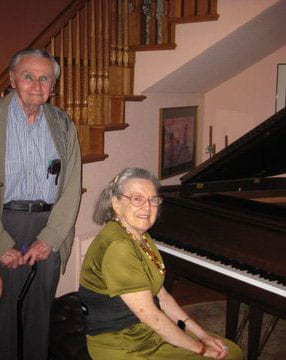
Louis B. Appleton, film producer, director and writer, died in Rancho Murieta, California, on Friday, January 4, 2013 after a short illness. He was 98 years old. Born on 13 October 1914 near Boston, Massachusetts, Appleton’s first credits as film producer in the late 1930s included Adventure in Sahara and First Offenders. After serving in the U.S. Army Signal Corps in the Pacific theatre during World War II, Louis Appleton returned to Hollywood to produce Strange Voyage (1946) and Never Trust a Gambler (1951), among others. During the mid-1950s Louis B. Appleton wrote a number of episodes for the TV series, The Adventures of Rin Tin Tin and directed his only feature film, The Desperate Woman (1958), with his wife, Anne, cast in one of the lead roles. From the late 1950s until the mid-1970s, Appleton served as assistant director for countless episodes of such popular TV series as Father Knows Best, Window on Main Street, and The Doris Day Show. Appleton’s 1945 documentaryabout General MacArthur, Westward is Bataan, filmed on location in New Guinea and the Philippines, was recognized with a U.S. Army Award shortly after the ending of World War II.
Married to Anne (née Strakacz) for 63 years, whose father was Ignacy Jan Paderewski’s personal secretary from 1918 until 1941, Louis and Anne Appleton became co-custodians of a considerable collection of documents and memorabilia left by Paderewski to his secretary upon his death. Known as the Paso Robles Collection in commemoration of Paderewski’s ties to this Central Coast community, this historically significant and unique archive was donated to the Polish Music Center at USC in 2008.
Always fond of music and great conversation with family and friends, Louis’s good humor, heartfelt hospitality, and sunny disposition continued on full display in his Rancho Murieta residence until the end of his life. He is survived by his wife, Anne, and their three daughters, Amy, Louise, and Marguerite.
Anniversaries
Born This Month
- 1 January 1927 – Juliusz LUCIUK, composer, musicologist
- 1 January 1872 – Tadeusz JARECKI, conductor (d. 1955)
- 1 January 1911 – Roman TOTENBERG, violinist and pedagogue
- 2 January 1894 – Artur RODZIŃSKI, conductor, music director (d. 1958)
- 2 January 1907 – Henryk GADOMSKI, composer and conductor (d. 1941, Auschwitz)
- 3 January 1885 – Raoul KOCZALSKI (d. 1948), pianist and composer
- 13 January 1921 – Wanda WILK, founder of the Polish Music Center(d. 2009)
- 17 January 1898 – Jerzy LEFELD, pianist and piano professor
- 22 January 1944 – Vincent SKOWRONSKI, violinist
- 23 January 1888 – Jerzy GABLENZ, composer (d. 1937)
- 25 January 1913 – Witold LUTOSŁAWSKI, composer (d. 1994)
- 25 January 1928 – Andrzej CWOJDZINSKI, composer and conductor
- 28 January 1717 – Just Franciszek KASPER, priest, composer, conductor (d. 1760)
- 26 January 1886 – Artur RUBINSTEIN, pianist (d. 1981)
- 31 January 1926 – Stanislaw PRÓSZYNSKI, composer
Died This Month
-
1 January 1953 – Ludomir RÓZYCKI (b. 1884), composer, pianist, member of the group Young Poland
-
9 January 1842 – Józef KROGULSKI (b. 1815), pianist, conductor, voice teacher
-
9 January 1981 – Kazimierz SEROCKI (b. 1922), composer, co-founder of the Warsaw Autumn Festival
-
11 January 1935 – Marcellina SEMBRICH-KOCHAŃSKA (b. 1858), singer – coloratura soprano
-
12 January 1934 – Pawel KOCHAŃSKI (b. 1878), virtuoso violinist, Szymanowski’s collaborator
-
17 January 1969 – Grażyna BACEWICZ (b. 1909), composer, violinist, pianist
-
19 January 1951 – Stanislaw GOLACHOWSKI (b. 1907), musicologist
-
21 January 1618 – Krzystof KRAINSKI [Crainscius], preacher, author of a song collection (b. 1556)
-
23 January 1946 – Feliks NOWOWIEJSKI (b. 1877), composer, conductor, organist
-
23 January 1921- Władysław ŻELEŃSKI, composer (b. 1837)
-
26 January 1946 – Ignacy FRIEDMAN, composer and virtuoso pianist (b. 1882)
